Christmas decorating ideas: 31 ways to elevate your festive decor
From alternative bauble arrangements to garlands these Christmas decorating ideas provide the ultimate inspiration for every room
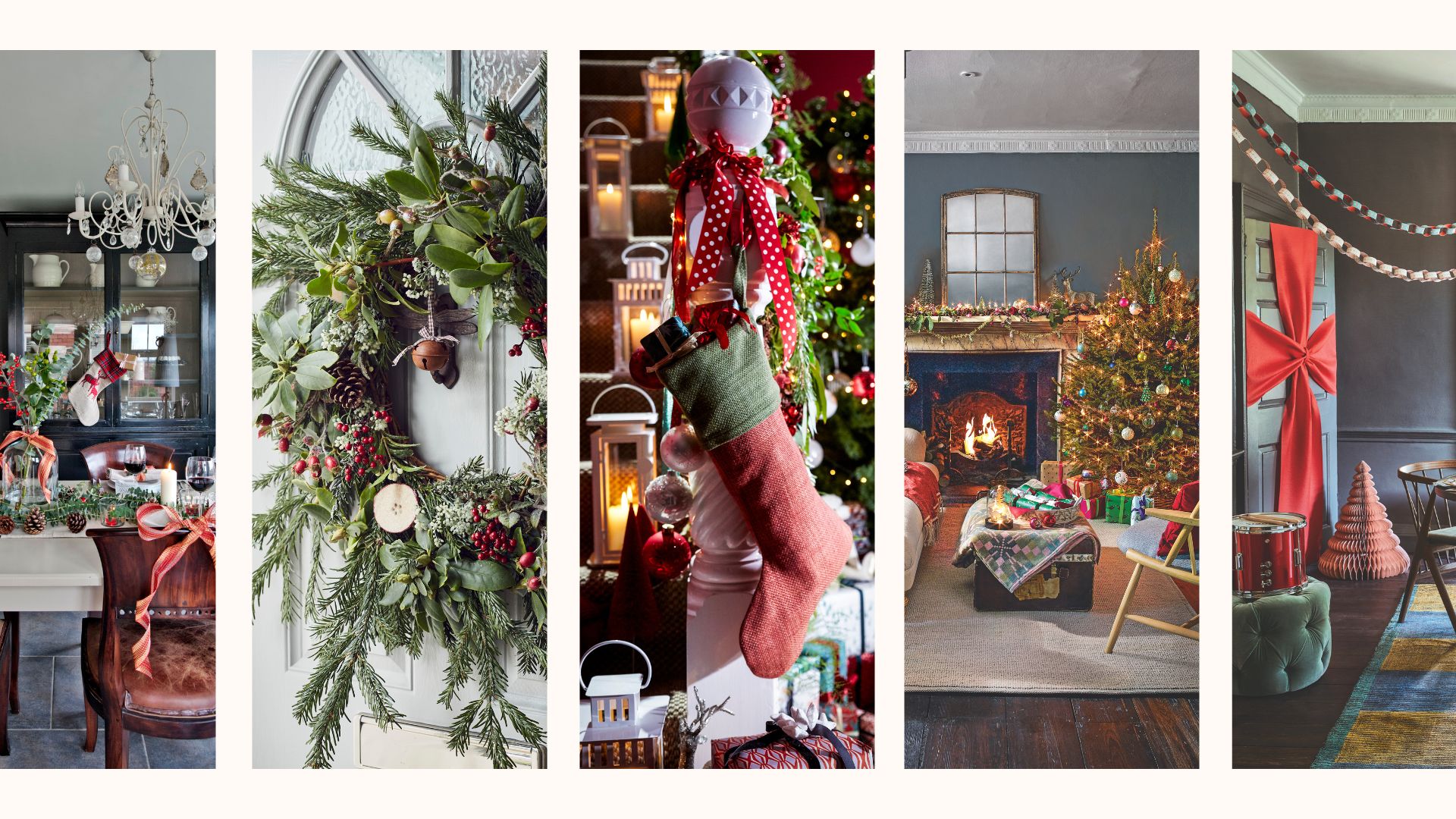

Tamara Kelly
Get your home 'guest-ready' for the holidays with these fabulously festive Christmas decorating ideas for every room of the house.
Whether you're decorating a small or large space, we've got Christmas decorating ideas for every area of the home to add a touch of festive fun to set the scene for the month ahead.
From unique Christmas tree decorating ideas and ways to style a hallway for Christmas to stunning outdoor decorating ideas, there's an easy idea to transform all areas for the holidays.
Christmas decorating ideas 2024
When it comes to arranging our Christmas decor each year, even the most confident decorators can be inspired by new ways of arranging essential festive elements such as garlands, wreaths, fairy lights, and candles.
Taking a fresh approach to where and how to place decorations can really breathe new life into your home for the holidays this year.
1. Create a captivating entrance
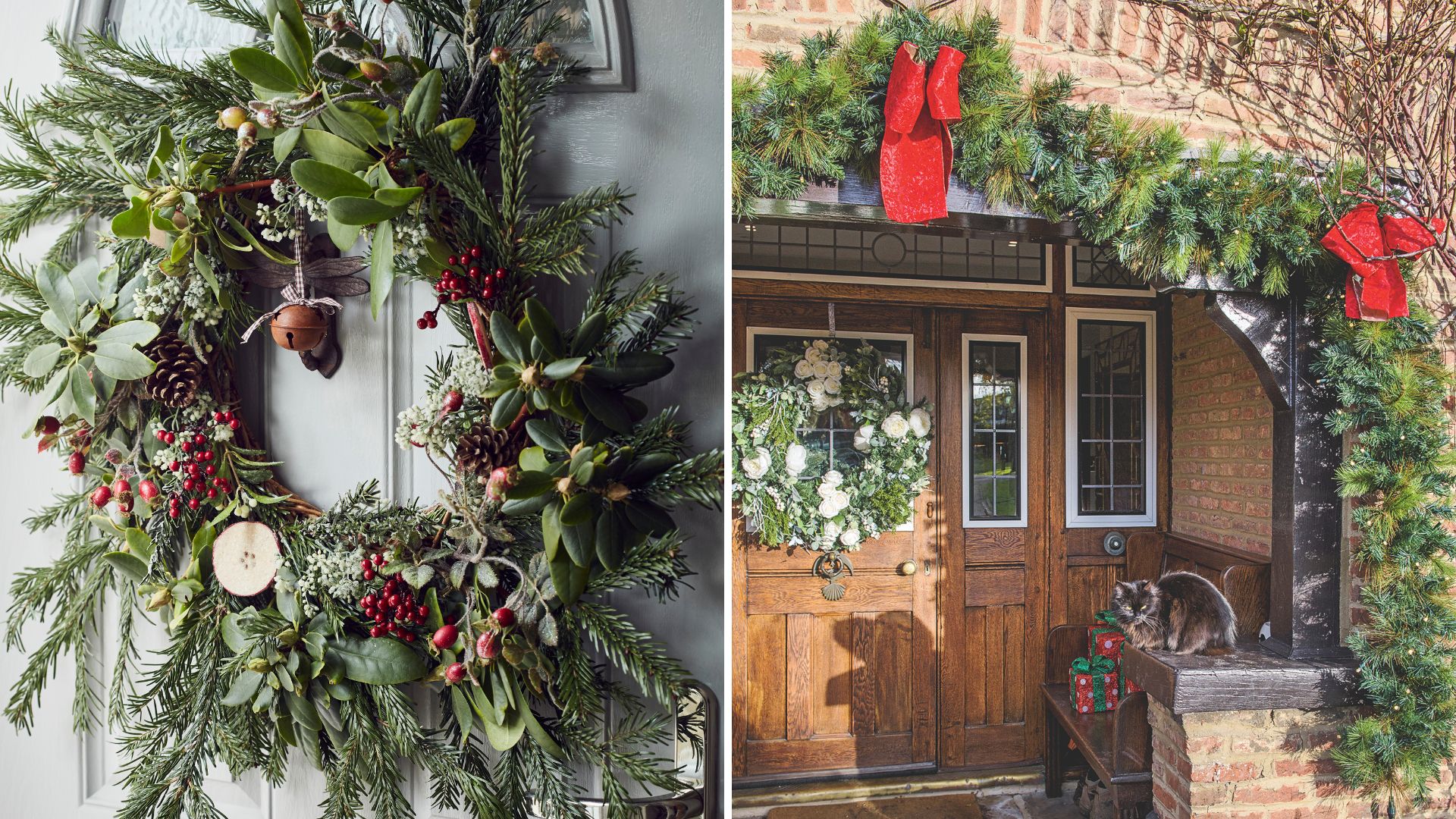
Use an entrance to set the scene for the rest of your Christmas decorating ideas. Not only creating a welcoming hallway for your guests but also giving you a feeling of joy every time you walk through your front door.
Adorn the front door with a beautiful wreath and seasonal shrubs and extra foliage gathered around the door to show that festive cheer resides on the other side.
Sign up to our free daily email for the latest royal and entertainment news, interesting opinion, expert advice on styling and beauty trends, and no-nonsense guides to the health and wellness questions you want answered.
"Christmas entranceways are impactful as they leave a lasting impression on both passers-by and guests you welcome into your home," explains luxury florist Ronny Colbie. "Whether it is a festive door wreath or a simple arrangement, having a touch of floral and fauna throughout the entrance to your home will create a welcoming feeling and help set the tone for a relaxing festive celebration."
2. Decorate windows
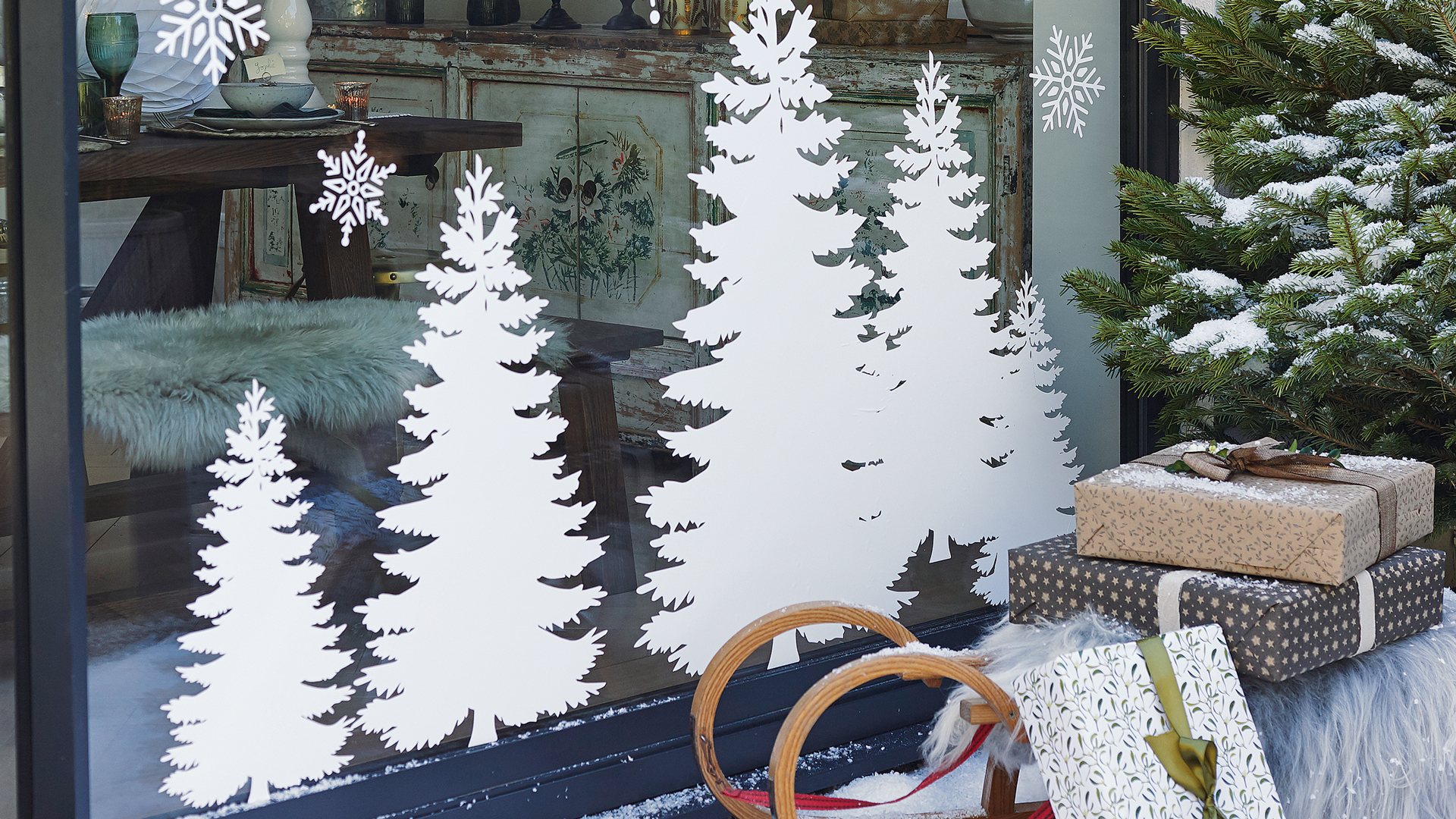
Extend the festive cheer to those who pass by decorating your windows. The trend for decorating windows with stickers and artificial spray snow has become hugely popular in recent years – as we yearned to share our Christmas decorating ideas beyond those who we invite inside.
From easy-peel Christmas tree stickers to snowflake stencils, it's never been easier to fill your windows with festive cheer to delight all. Decorating the windows is a winning idea for all, those indoors will gain a sense of all-encompassing decoration while the neighbours can enjoy your decorating efforts from afar.
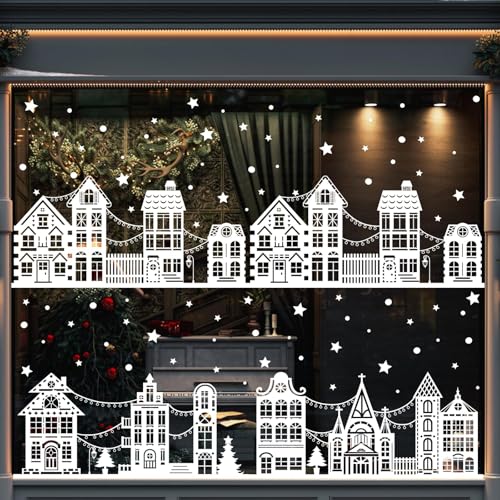
RRP: £9.99 | Add a charming street scene with this Christmas window decals. The stickers are double-sided and reusable.
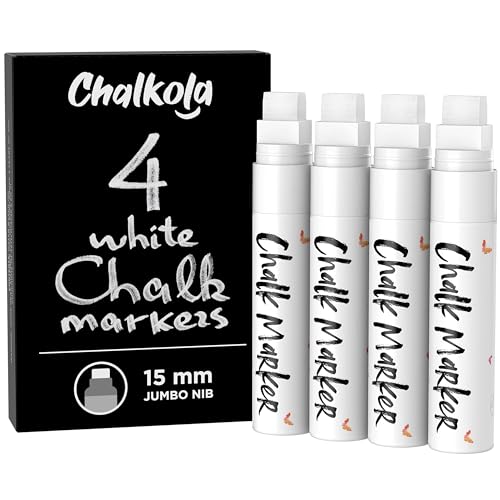
RRP: £14.95 | This set of 4 window markers is ideal for artistic folk who want to leave their own stamp on the decorations. They can also be used on chalkboard and blackboards.
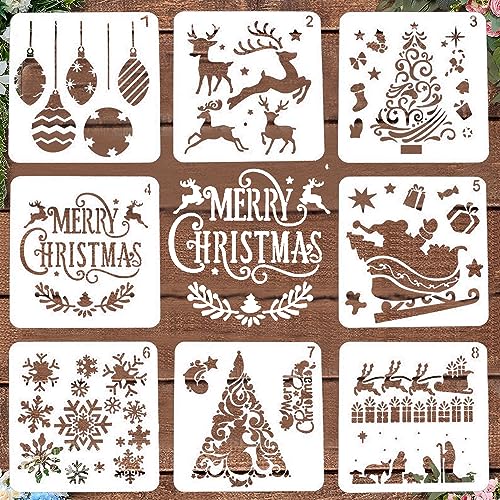
RRP: £3.99 | This sweet set contains a reusable stencils of Santa Claus; snowmen; snowflakes and Moose to offer the freedom to decorate multiple windows in any room.
3. Adorn the walls with decorations
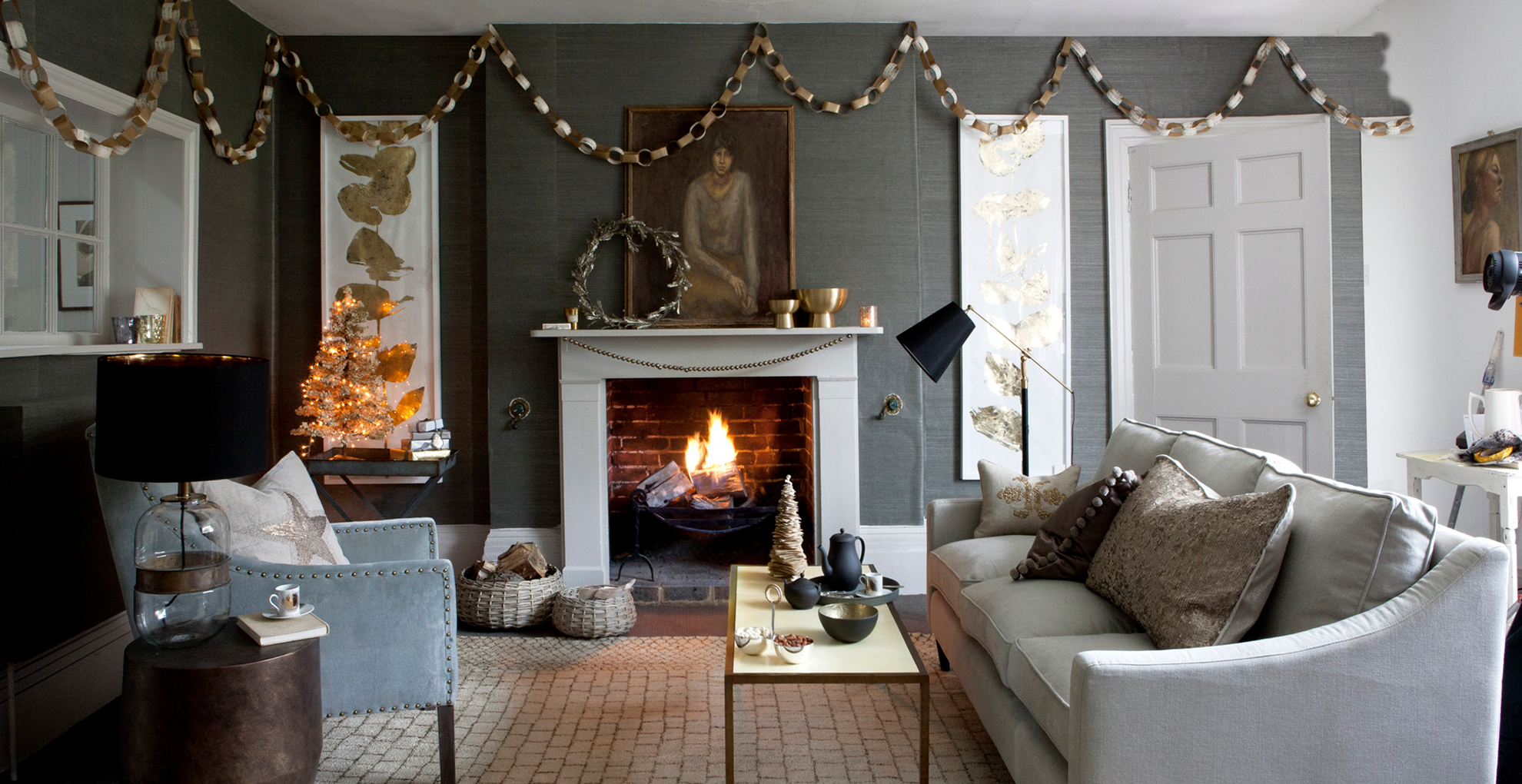
When it comes to decorating a living room on a budget you can't beat classic paper chains. Not only are they easy and affordable to make yourself, but they are also lightweight and ideal for hanging from any surface safely.
We love how the simple charm of paper chains elevates the decor in this living room (above). You can use A no-mark solution such as UHU White tack from Amazon to fix them to walls without causing damage.
4. Decorate your light fittings
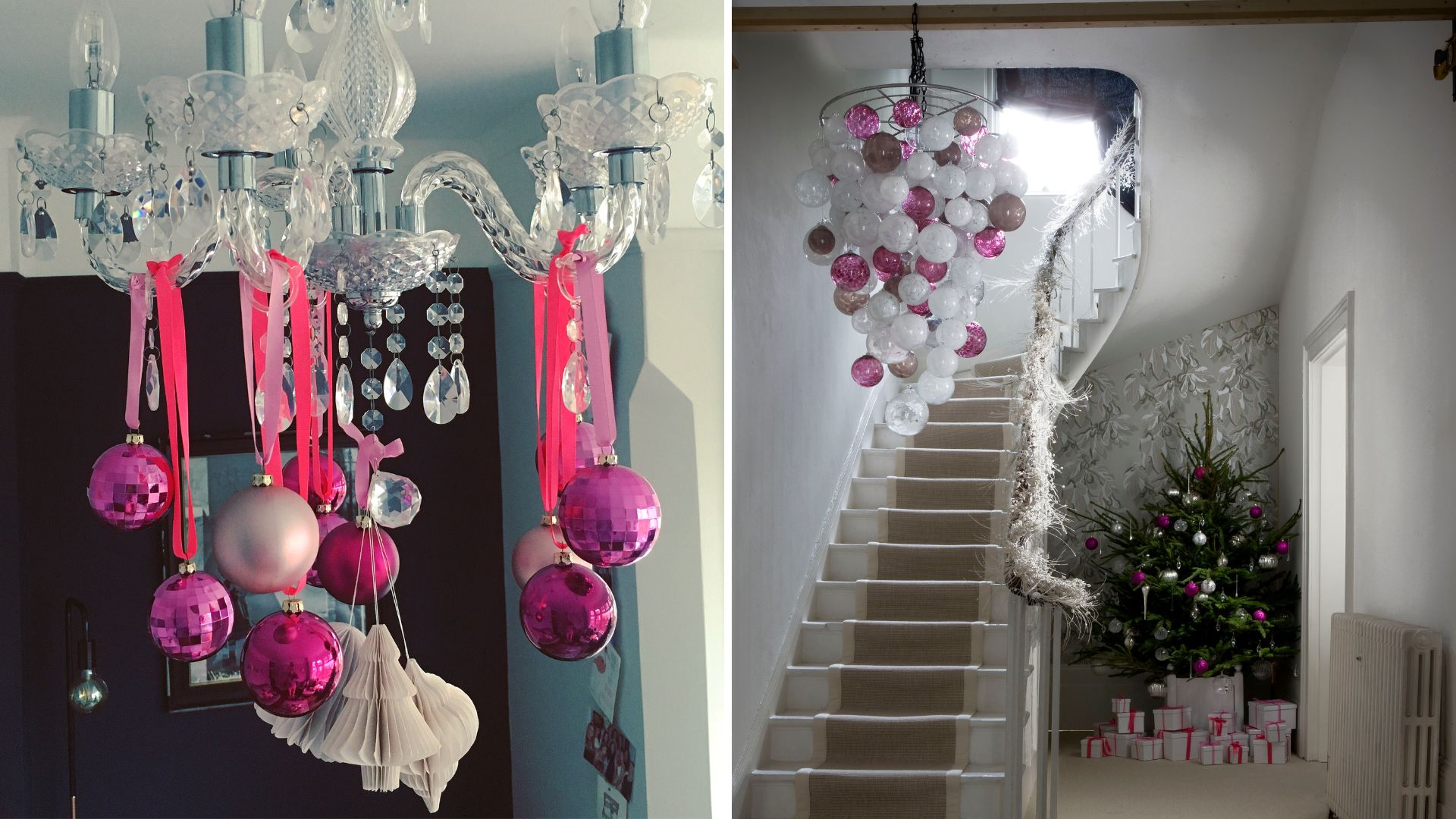
Elevate your Christmas decorating ideas this year by leaving no household essentials untouched – including your light fittings. So simple yet so effective, hanging a selection of decorative baubles from pendants and chandeliers helps to take Christmas tree colour to new heights by coordinating the theme. It also creates an imaginative Christmas centrepiece for every room.
Choose to hang your baubles with coordinated lengths of ribbon to add an elegant touch and a further pop of colour, or create the illusion of floating decorations by suspending your ornaments from a clear twine.
Ensure you use shatterproof baubles to save any breakages, should you accidentally drop one during the decorating process.
5. Display mini Christmas trees
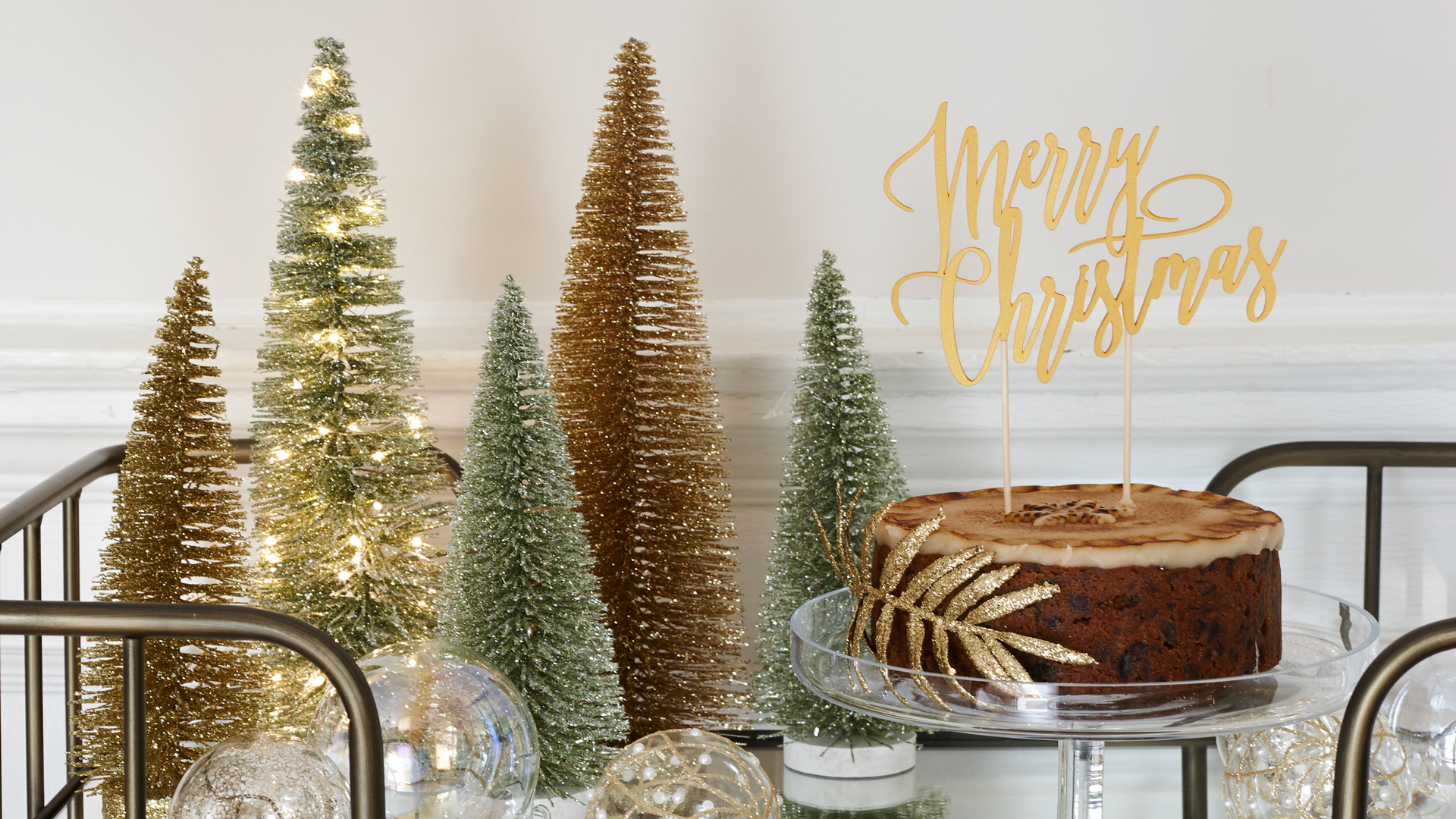
If you really want to up the festive ante in your living space, there's no need to stop at one Christmas tree. Decorating your surfaces (be it a mantel, your sideboard, or your TV cabinet), with mini Christmas trees is a great way to continue the theme throughout the rest of the space, and instantly elevate your decor into a festive wonderland.
Jess Martin, a decoration expert at Ginger Ray, says "Mini tabletop trees are one of the best Christmas decorations in any home and fit with most interior styles. A top styling tip is to arrange them in odd numbers – it makes the overall effect elegant and well-thought-out."
6. Decorate your tree with a pretty tree skirt
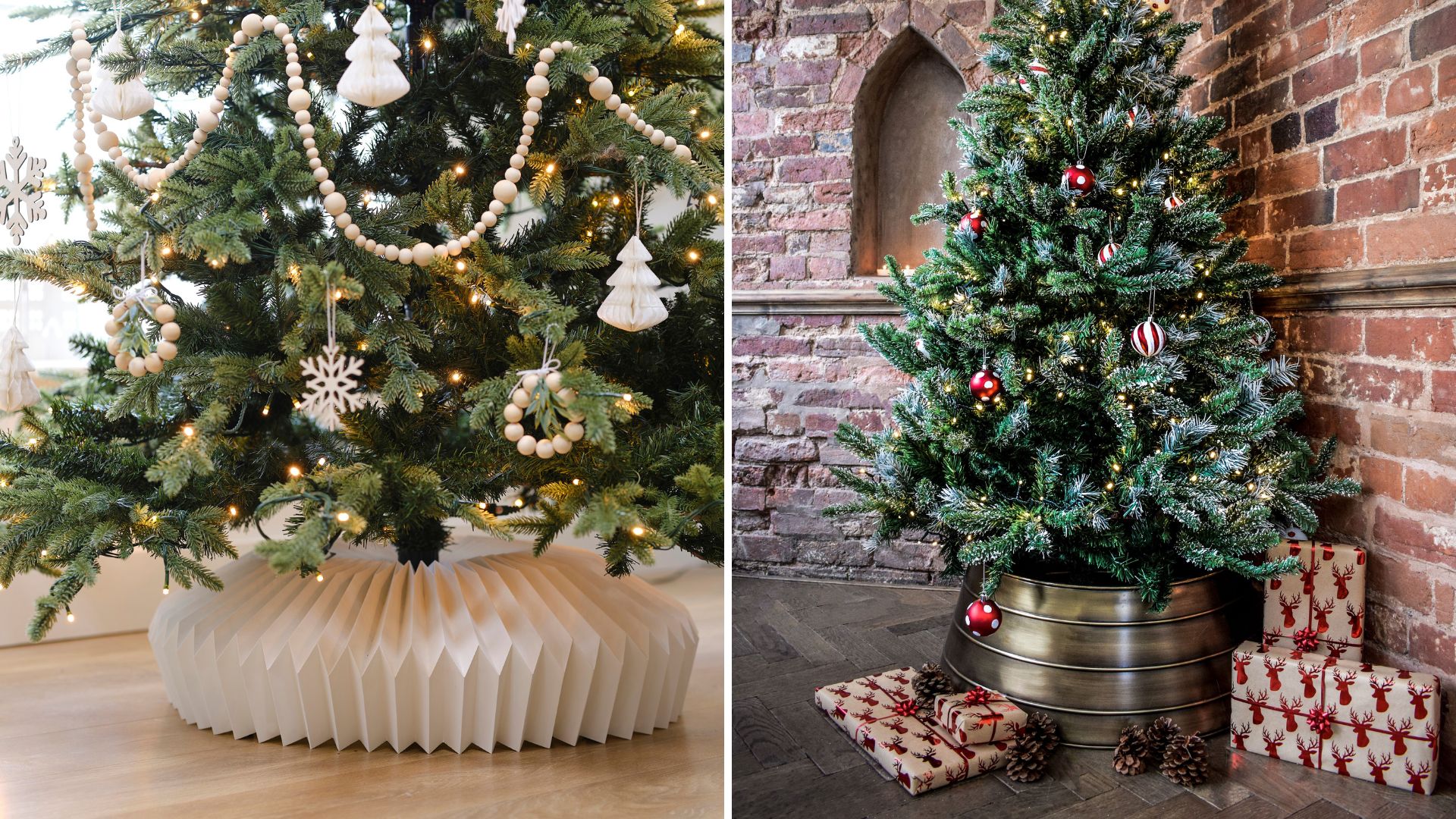
Sure, decorating your home with a tree, be it one of the best real Christmas trees or an artificial one, is a given but this finishing touch is often overlooked. To jazz yours up that little bit further, have you ever considered adorning it with a Christmas tree skirt?
You can get all different kinds – such fleece ones that emulate the look of snow gathered around your tree, decorative metal material, or rustic woven designs. Any material will help to play a crucial role in concealing the pot of a real tree or the unattractive stand of even the best artificial Christmas tree, making tree skirts the ultimate Christmas tree decorating idea to add a perfect finishing touch. Take your pick of designs and watch your tree come to life.
7. Decorate with multiple small trees
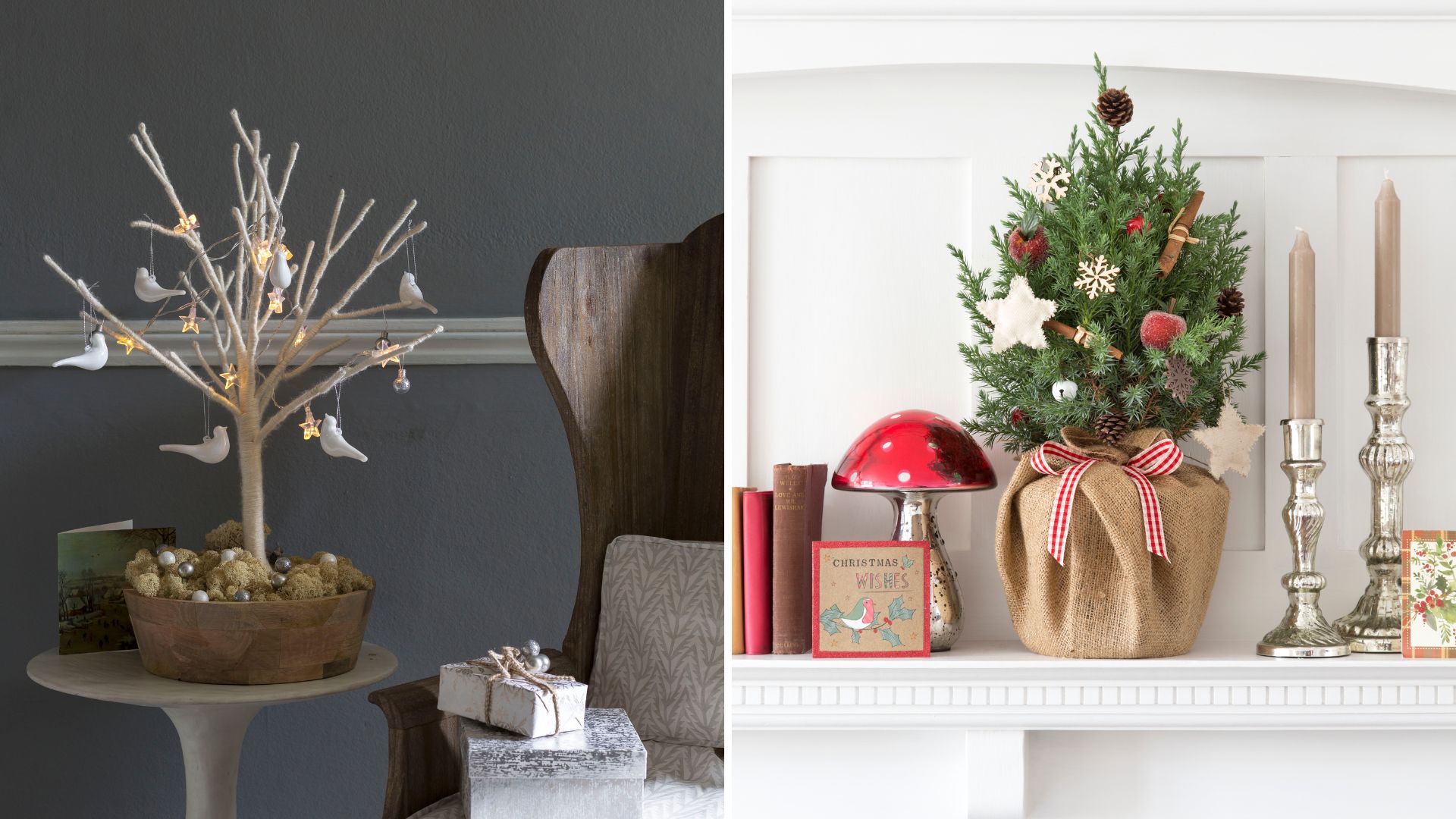
If you have the space, you could really take your Christmas decorating to the next level by setting up multiple small Christmas trees in your living room - like mini main Christmas tree alternatives. They're space-swallowers, but you could create your own festive wonderland by doing so if you have the floor space to spare. Decorate them all minimally and uniformly to ensure you don't make the decor too busy and overwhelming.
Or, you could even use stylish twig trees to create the same effect, without taking up as much room. We’re seeing a rise in twig trees, and minimalist, asymmetrical designs are growing in popularity in modern home interiors.
You can buy a small Christmas tree online with ease, just be sure to get your measurements correct.
8. Lay a garland at the head of your bed
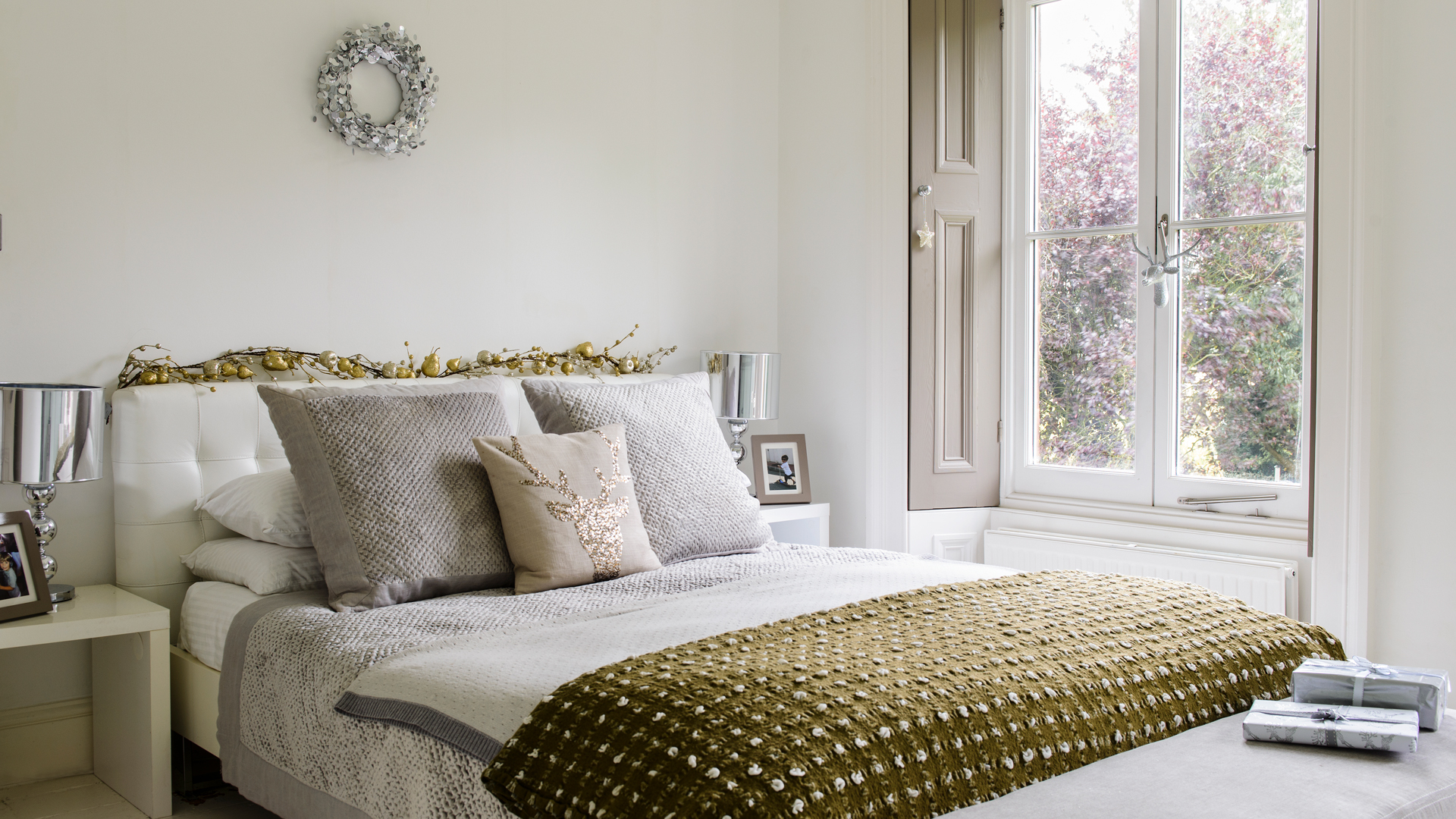
Decorating your bedroom for Christmas can feel trickier than decorating the rest of your home, as there's generally less free floor space, and decorating a bed can feel like a tricky task. But an easy way to do it is to layer a festive garland either on top of your headboard (if your bed is against the wall) or weave it around your headboard if you have a metal frame.
This simple decorative touch is enough to make a bedroom feel cosy without taking up any room. You can choose either a thicker, bushy garland or a thinner, elegant option depending on the space you have.
9. Add festive throws and pillows to any room
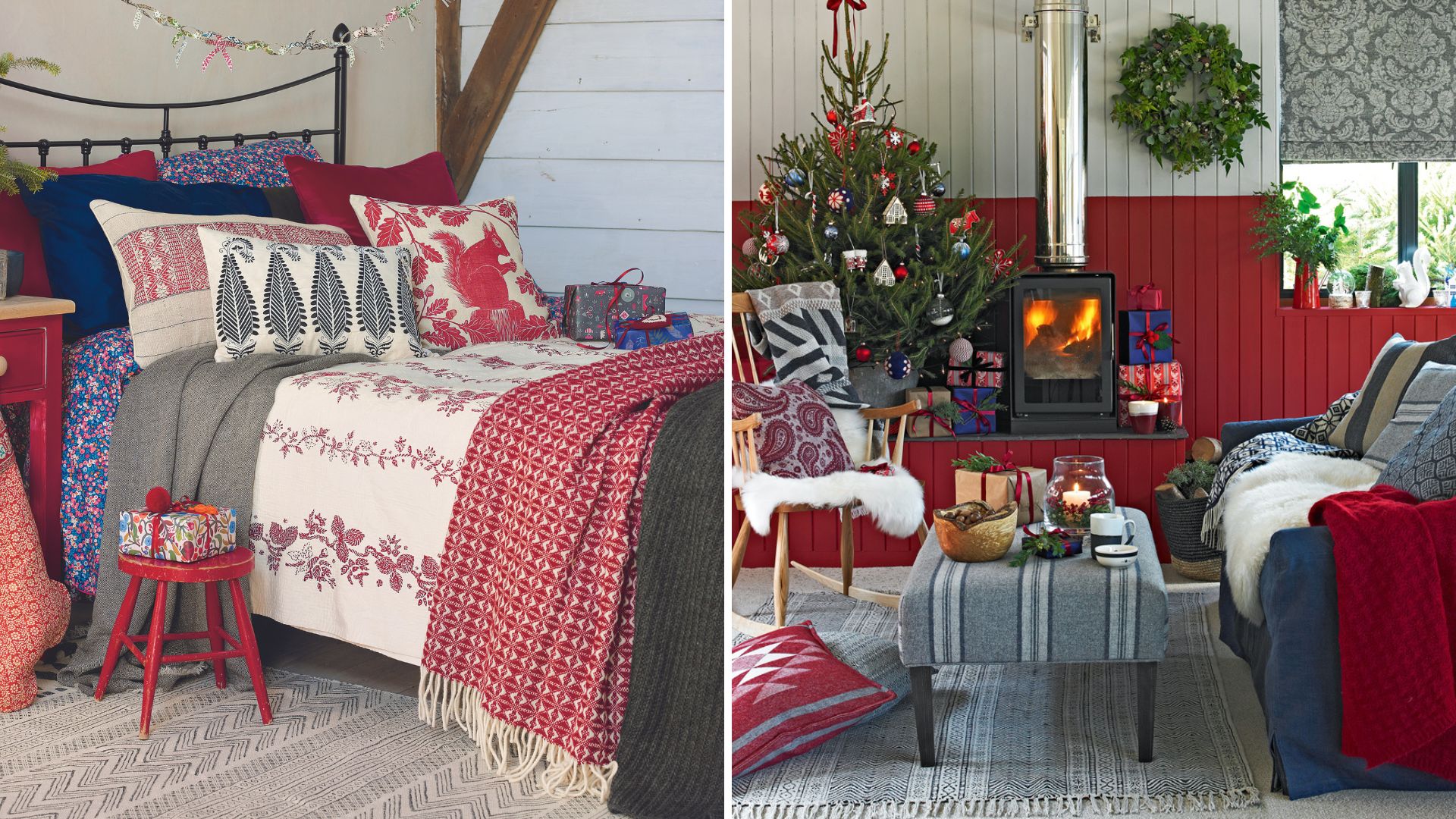
When it comes to how to decorate for Christmas, throws are an essential way of making a home feel cosy, adding layers and texture to our sofas, beds, chairs, and entryways. So why not switch yours up for the festive season and make it multi-functional?
By switching out your regular throws and pillows for seasonal alternatives (perhaps one that comes in traditional Christmas colours, such as red, white, or green), you'll have a piece of festive decor and something cosy to cuddle up with during those chilly winter evenings!
You can also invest in some Christmas bedding for your bedroom and the guest room to fully embrace the festive season throughout December.
10. Hang stockings in your desired festive colour scheme
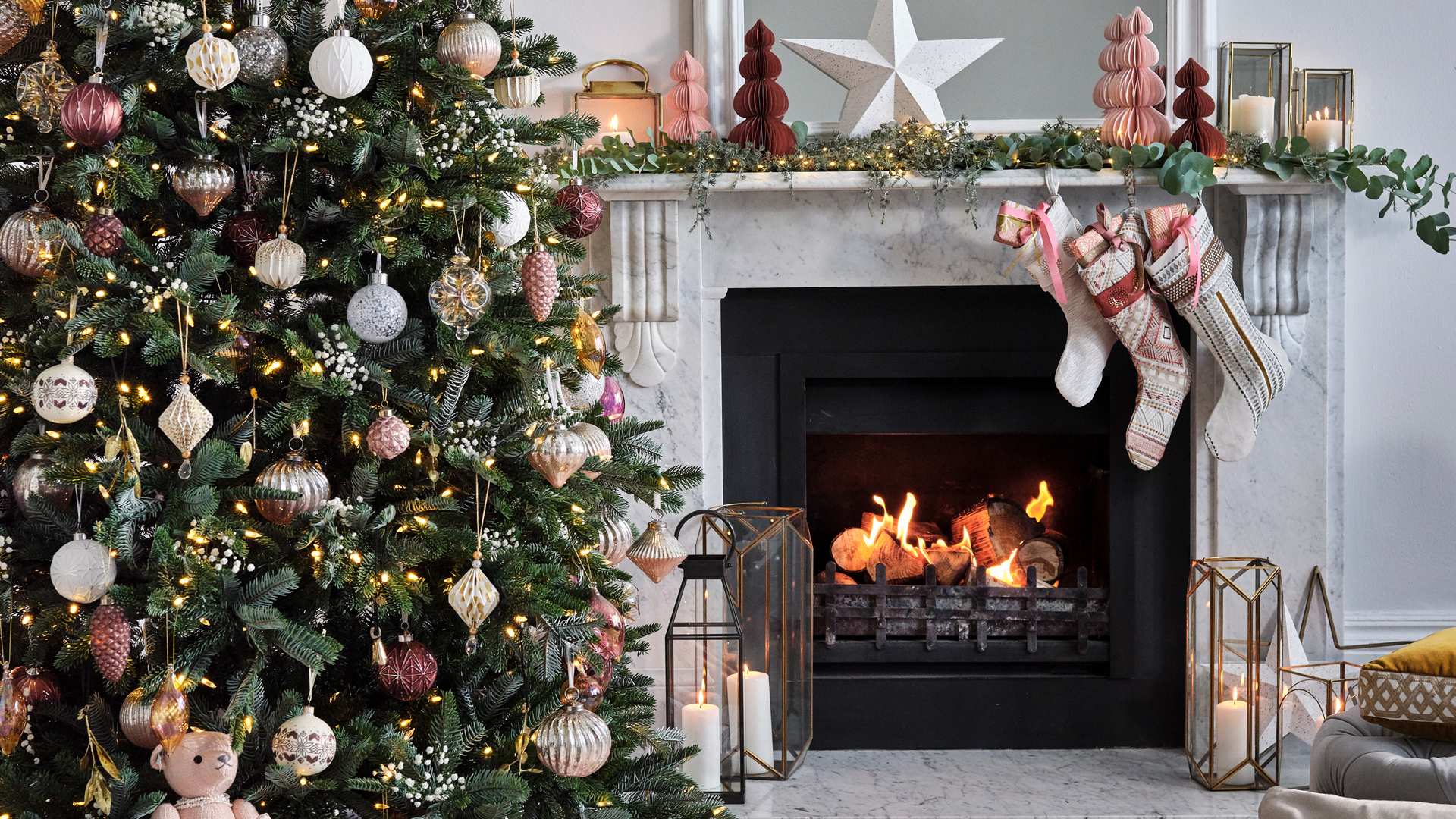
Stockings aren't just for Christmas Eve, hang them out earlier and they can become a brilliant way to elevate your seasonal decor. Ditch the gimmicky options you've had for years and opt for stylish stockings that match the festive colour scheme throughout your home.
You can hang them anywhere too. Over the mantel is the tradition, using stocking hangers for fireplaces, but you can buy adhesive hooks too which means you could add them to a dresser, side table, or on the wall too if your heart desires.
11. Scatter candles around your home
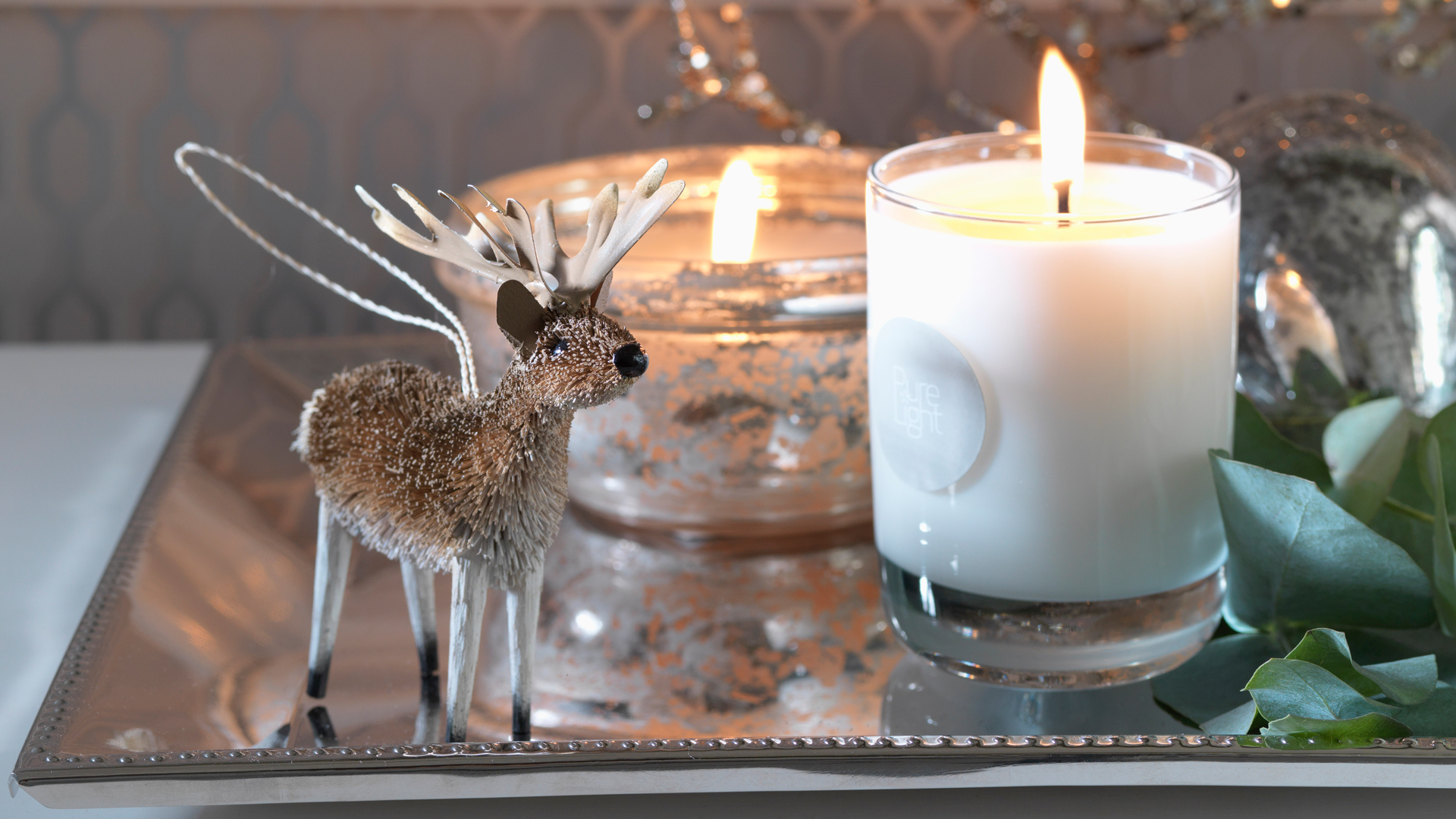
Truly, nothing gives off more of a cosy, comfortable 'stay-at-home-for-the-whole-of-December' look than candles, especially when they are lit in the evening in place of your actual lights.
So for a super simple Christmas decorating idea, simply pop as many as (safely) possible all around your home – on coffee tables, dining tables, side tables, windowsills, and kitchen counters. For safety, we recommend the best flameless candles.
We'd also advise opting for white candles (they can be real or flameless!), for a traditional Christmas feel, too. Once they're lit, you'll feel as though your home is a festive wonderland.
Additionally if using the best Christmas candles, your home will smell incredible too. We love 'Glowing Embers', one of the most popular Jo Malone candles, for a truly cosy aroma.
12. Embrace natural decor for a rustic look
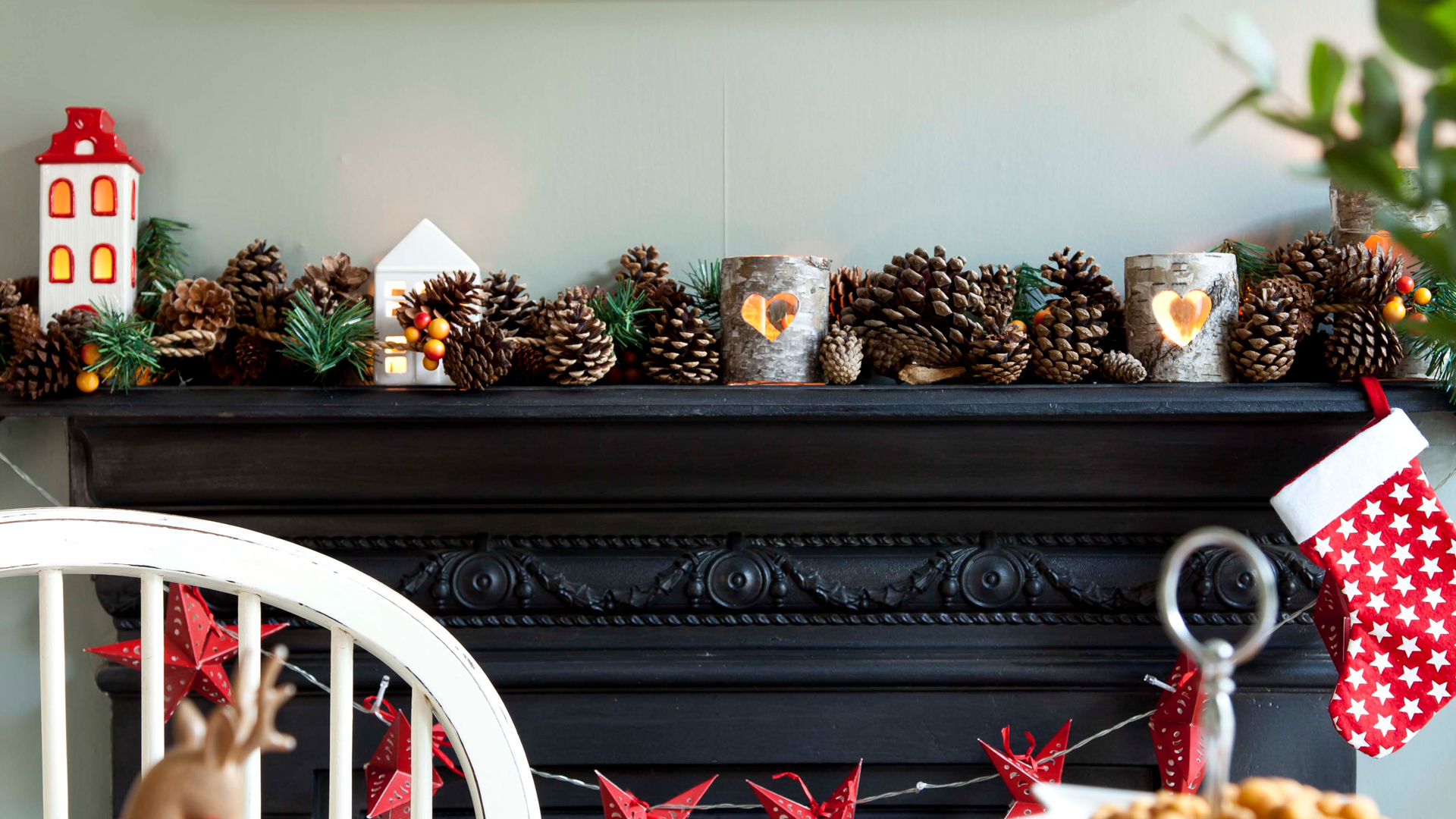
Turn your autumn decor ideas into festive ones. You can forage gorgeous festive decorations yourself simply by enjoying a woodland walk and collecting fallen foliage to use as natural decorations – from pine cones to twigs and holly, some of the best decor items don't need to be bought.
Once you've got your goods, a lovely way of displaying them is to thread them onto some string and hang them in a group in several places around your home, be it in a door frame, a window frame, or simply up against a wall. Or to keep it simple you can dress shelves and mantels by clustering your foraged finds with interspersed candle votives to add ambient light.
Dry out some sliced seasonal citrus fruit too (namely oranges), for a bit of colour, and you'll have one of the most unique Christmas decorating ideas around.
13. Add festive foliage to your favourite vases
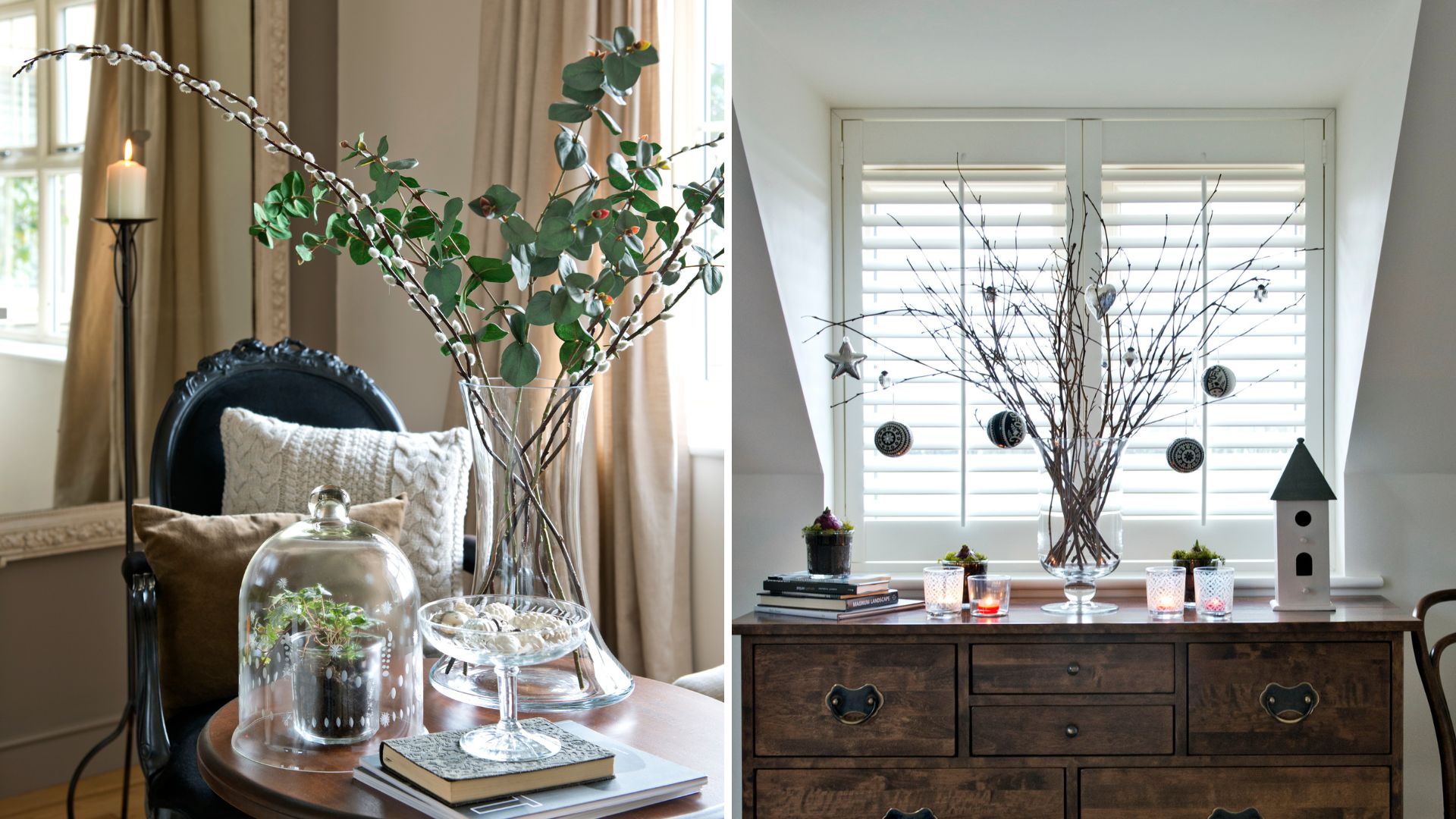
One of the most simple Christmas decorating ideas, why not replace your favourite flowers with some sprigs of festive foliage? It's incredibly easy to do and highly effective to create a delightful seasonal display.
You can normally buy branches of foliage from any of your preferred retailers or local florists, and all you need to do is arrange a few of them in your favourite vase. We'd recommend a clear vase so you can see the entire decoration!
14. Cascade fairy lights from curtain rails
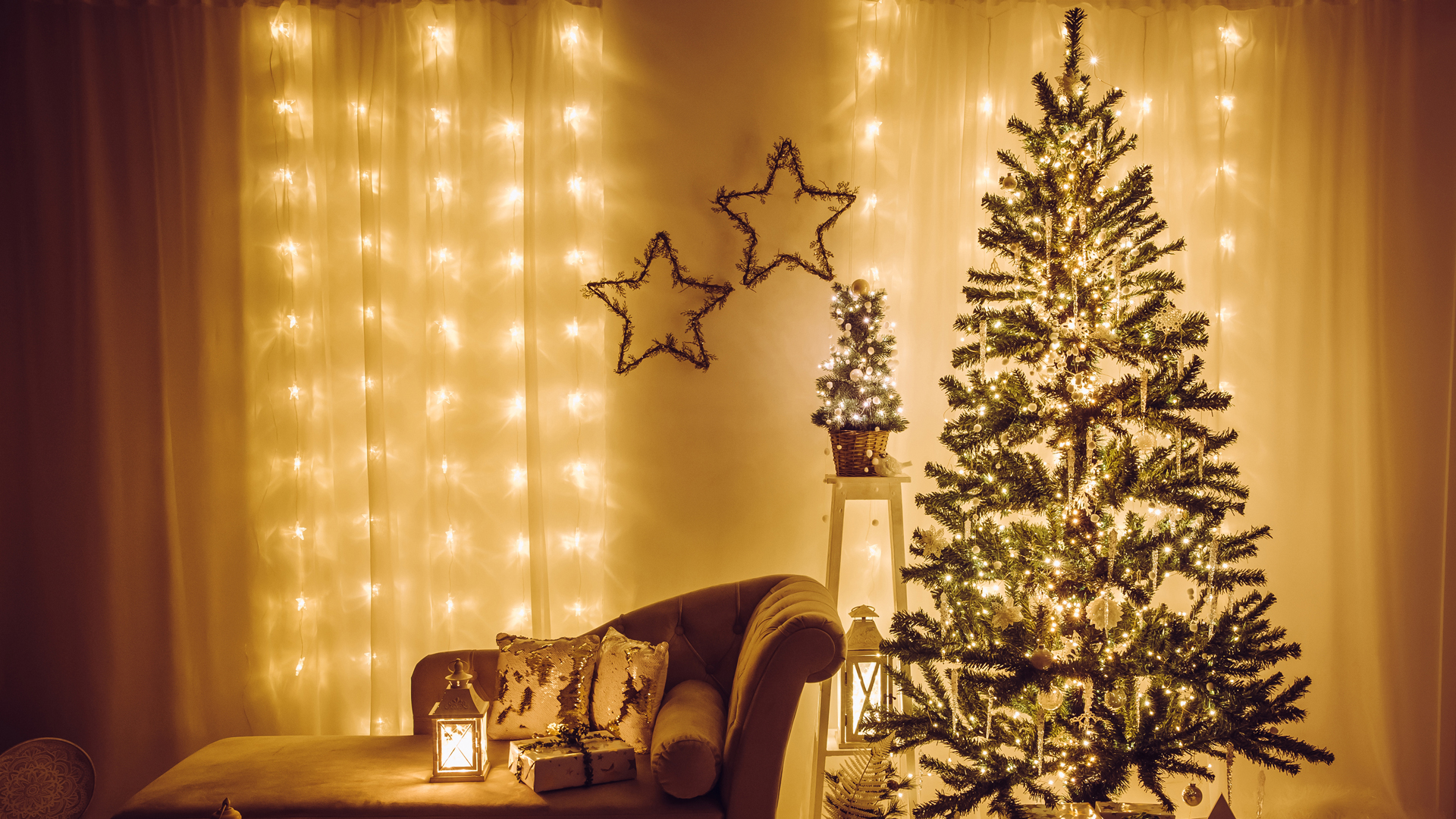
We all love fairy lights as our first choice for Christmas tree lights, but have you ever considered attaching them to your blinds or curtains? Trailing single reams of twinkling lights vertically down your window treatments can create a really special 'Santa's Grotto' feel, and will make your home feel extra cosy after dark.
Considering the light colour temperature Jess advises, "Stick to warm yellow fairy lights for a classic look." Just make sure to check the manufacturer's note on your LED fairy lights to ensure that wherever you hang them isn't a fire risk.
15. Replace your regular prints with festive touches
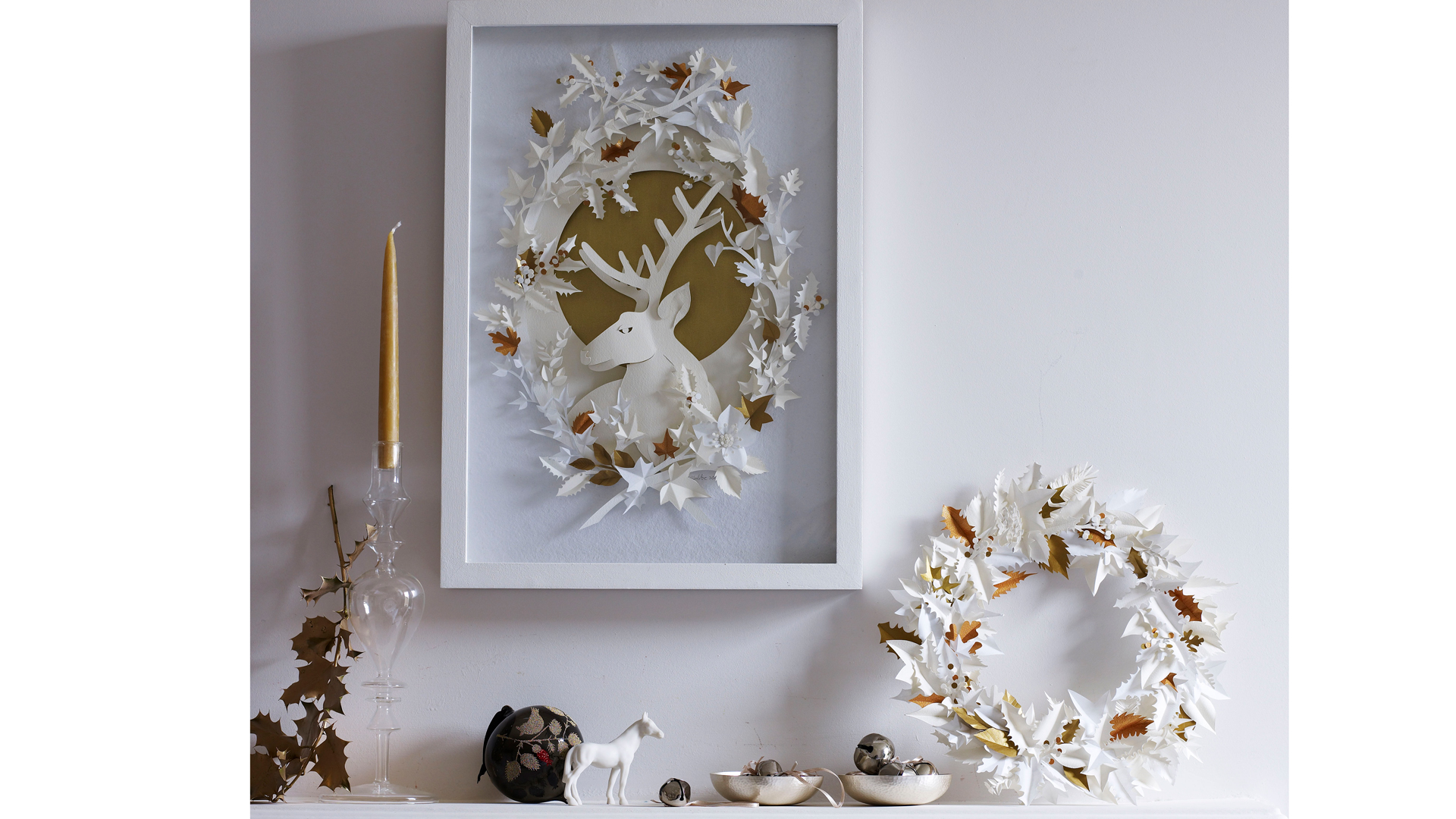
Don't overlook the thoughtfully placed artwork in your home. You'll likely have arty or stylish prints hanging right now which provide the perfect accessory to switch up for the festive season. Whether chic minimalistic black and white prints or fun, colourful abstracts it's time to change your artwork for the holidays.
This simple but effective Christmas decorating idea is an easy way to create a more festive feel in your living room to replace these for the month of December (and November, if you want), with more Christmassy prints.
We love the idea of a festive quote, which would suit most existing home decor schemes but if you're feeling daring, why not opt for a colourful festive print?
16. Place wreaths on windows and walls
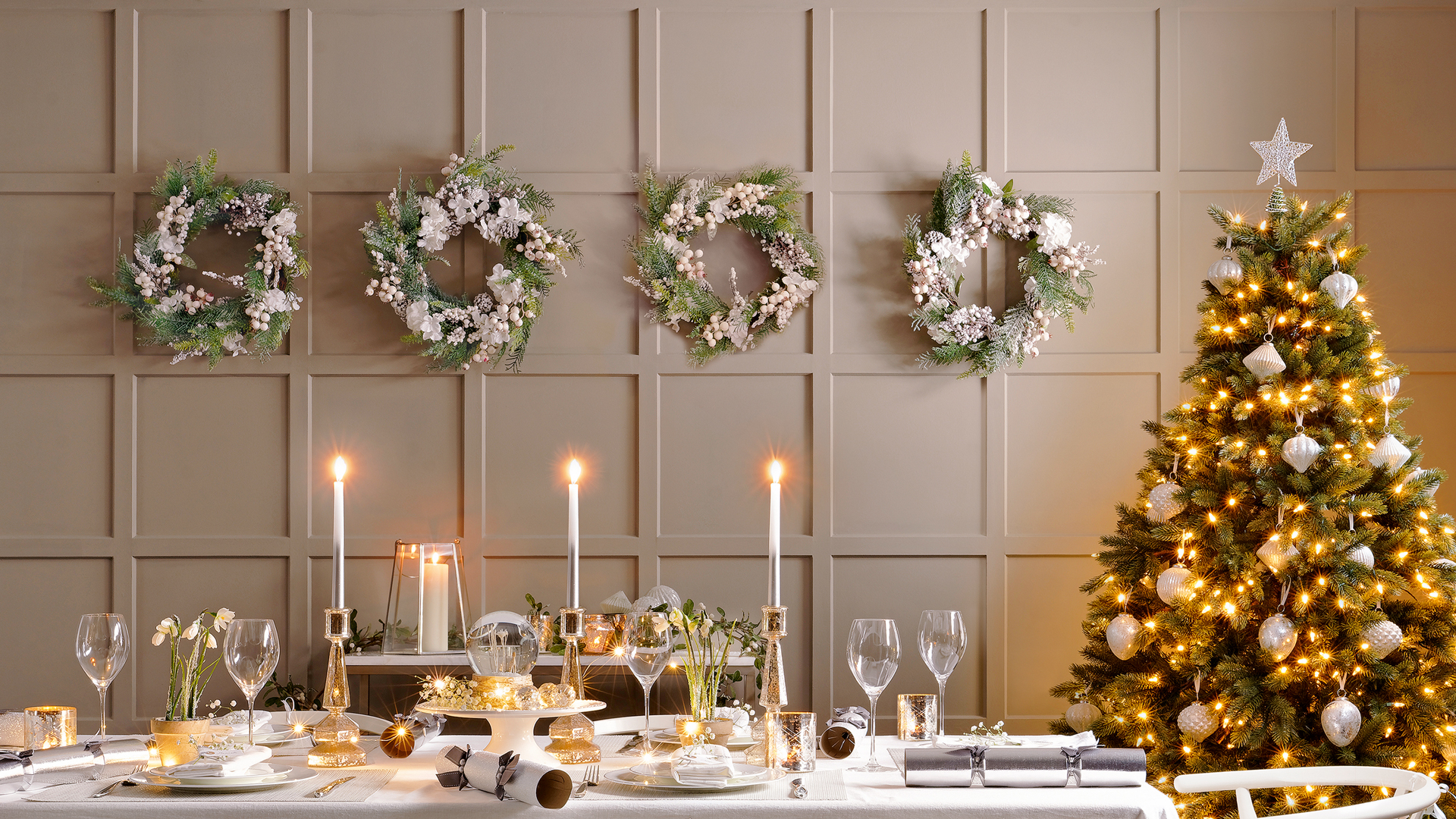
The best Christmas wreaths only belong on the outside of windows and doors, right? Wrong. If you're looking for ways to add a bit of seasonal spirit to your interiors, you could consider hanging wreaths on internal doors and even walls in place of pictures (where hooks will already be in place).
Ensure this decor tip doesn't get overwhelmed by hanging the same wreath design in every area – choosing a different wreath for each zone is time-consuming and would make the room look too busy.
17. Pop a Christmas centrepiece on your table
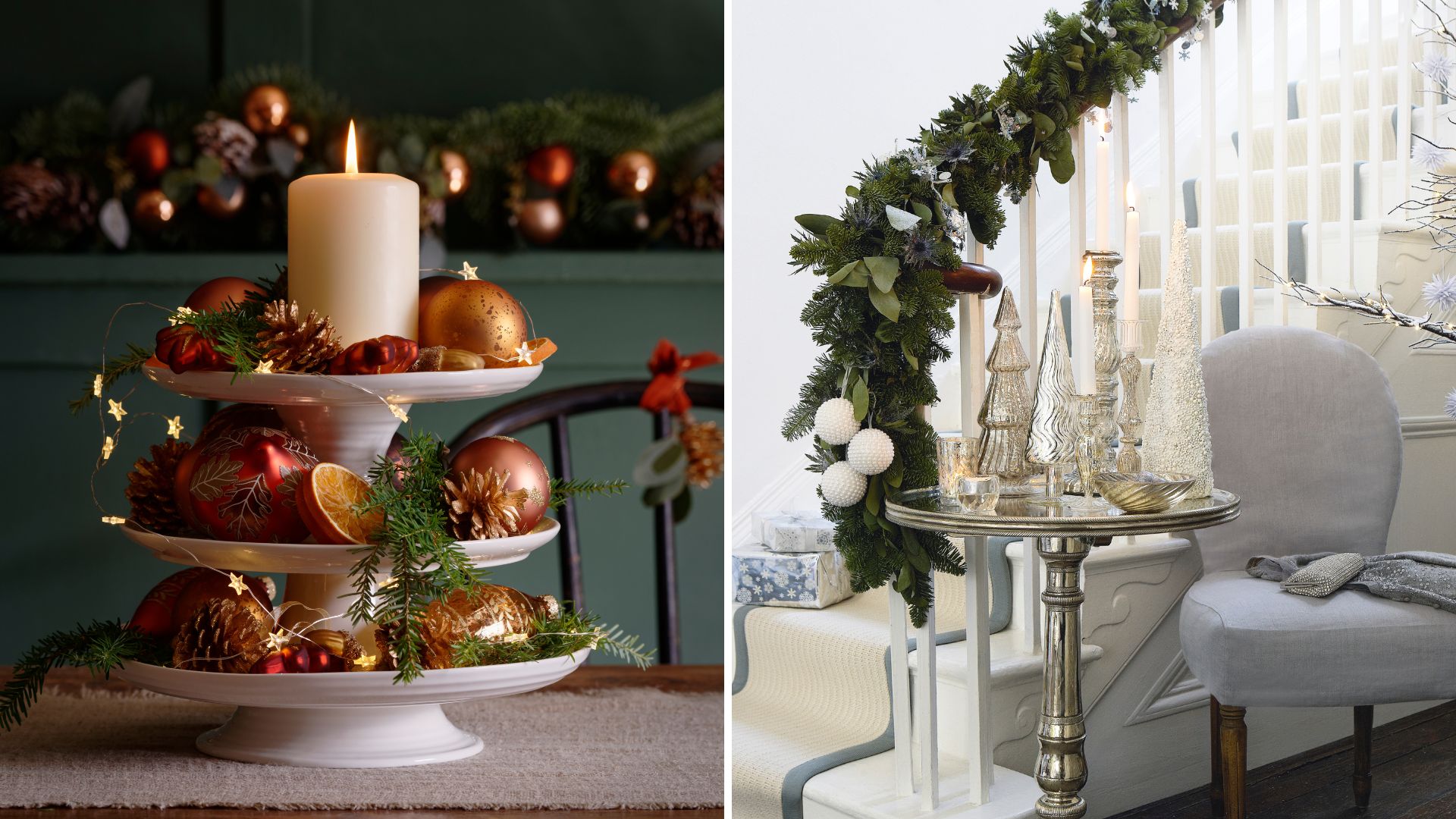
The best Christmas centrepiece ideas can really elevate your festive table, so why not also consider putting another on your living room coffee table, or on a spare space on the sideboard? They are both captivating and impressive and will allow you to contain your Christmas decor in one, easy space (because let's face it, it can take over). And for a treat for guests, add luxury Christmas crackers for a completely festive look!
18. Display logs in your fireplace for a rustic feel
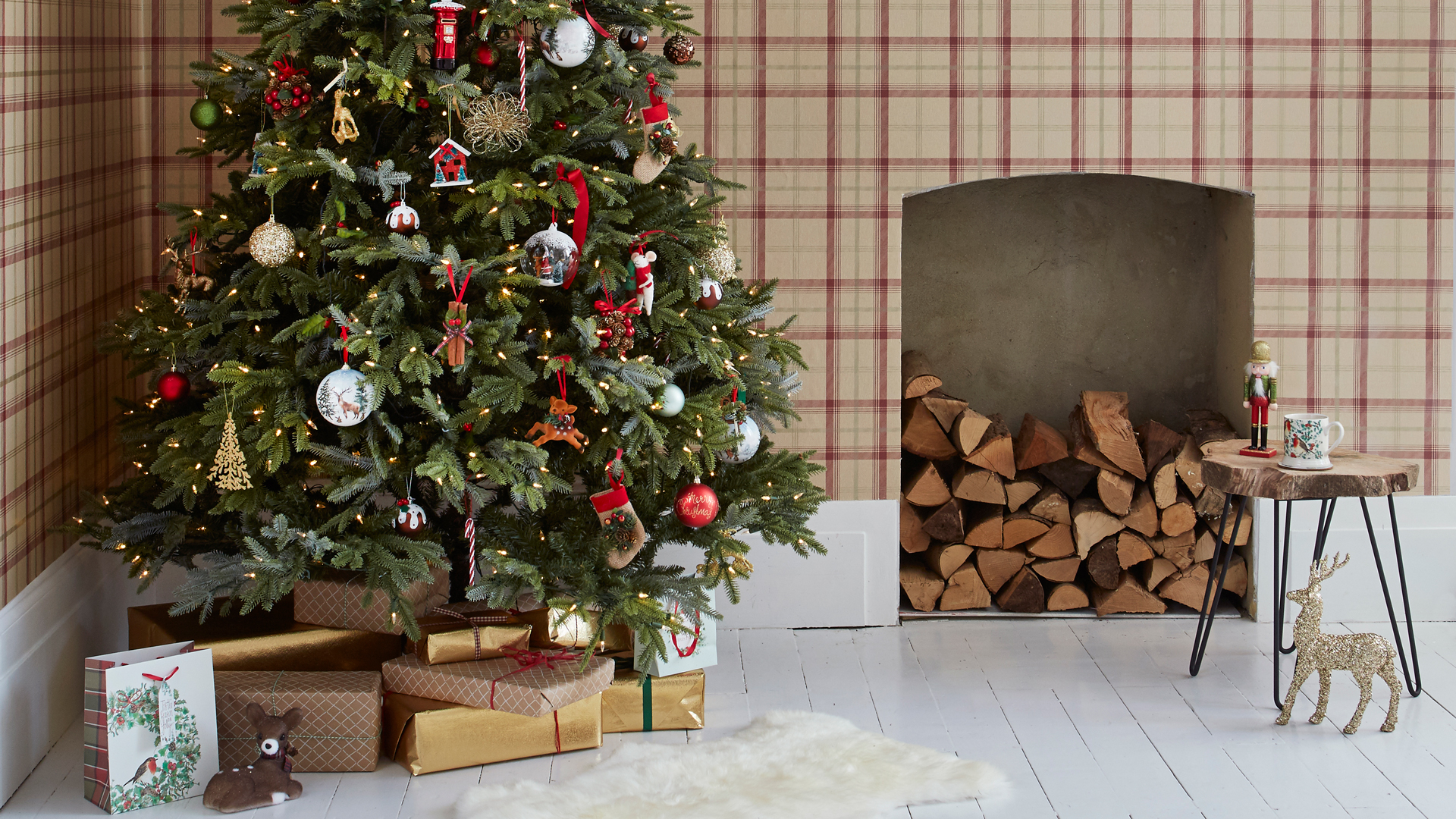
If you're lucky enough to have an open fire, utilize the space over the festive season by placing real wooden logs in there when the fire is not in use. Not only is it a great storage space, but it also creates the feeling of being in a rustic wooden lodge - the dream winter escape in December.
19. Hang garlands on your kitchen cabinets
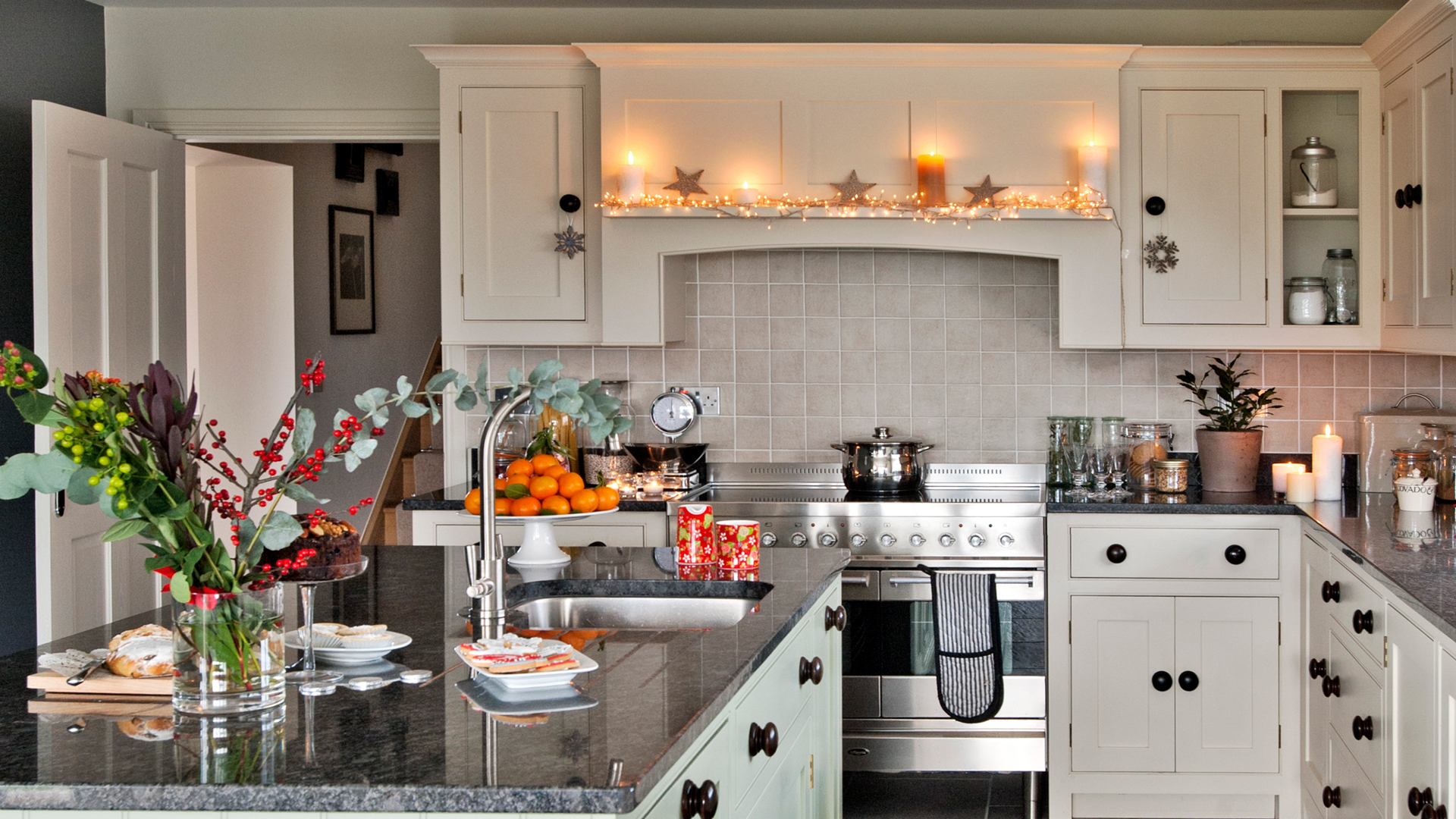
The kitchen can be a tricky area to decorate for the festive season, but one easy way to do it is to place a garland or a string of fairy lights across your cooker hood or on top of your kitchen cabinets if you have a gap between the top of the cabinets and the ceiling.
Just make sure you don't drape it across multiple cabinets, which will hinder you from actually being able to open them – because the kitchen is one of the most essential rooms to use with ease over the holidays. All the more reason to make a kitchen feel cosy.
20. Dress dining chairs with decorative touches
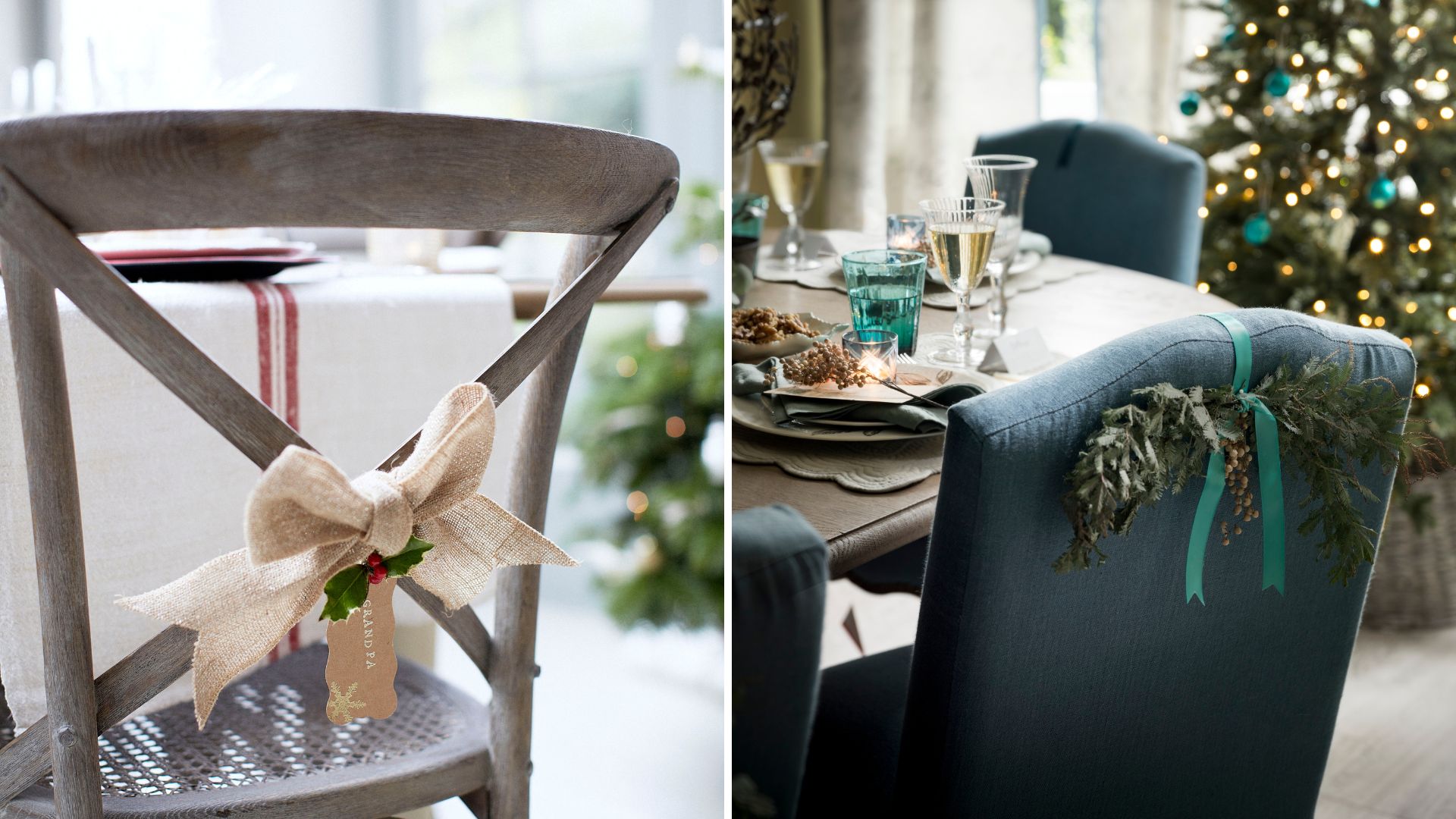
A simpler way of adding some decor to your kitchen is to adorn it with as many wreaths as you can fit. A great place to put them is either on your cooker hood or on the backs of any bar stools or dining table chairs you might have.
Just be sure to use them sparingly if you only have a small kitchen space, as it could quickly overwhelm your cooking and dining area.
21. Drape a garland across your windows
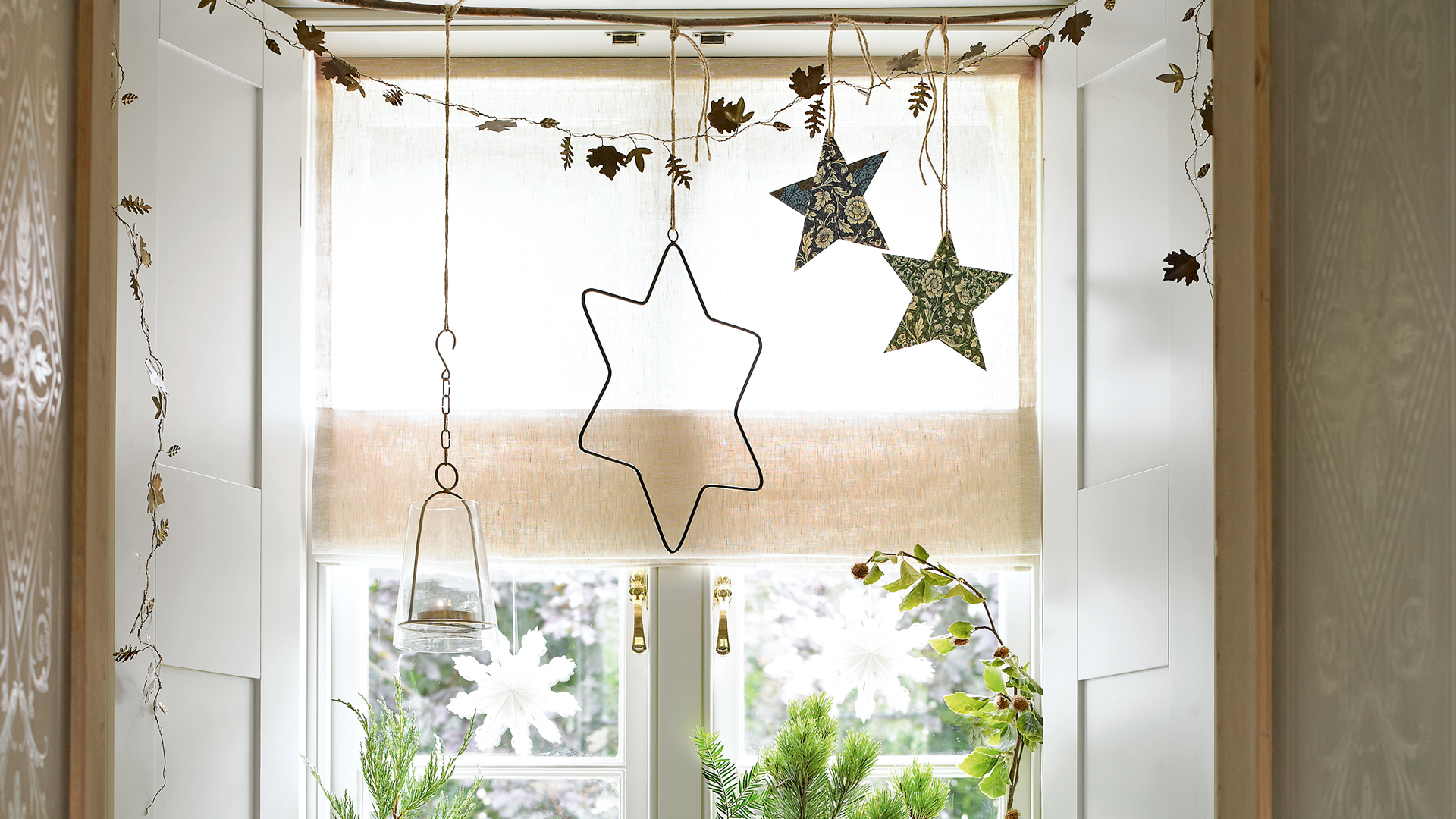
You could also hang a garland across the top of your kitchen window, which would really elegantly frame the space for a really striking look. Take inspiration from the above picture and create a little decor area if you also have a kitchen windowsill – don't be afraid to add dangled snowflakes, or spray-paint the edges of the window with faux snow.
You could also hang wreaths on the inside of your windows. If you've got a large window in your kitchen, why not try hanging two or three or, stick to one if you only have a small window.
22. Fill a tray with Christmas decor
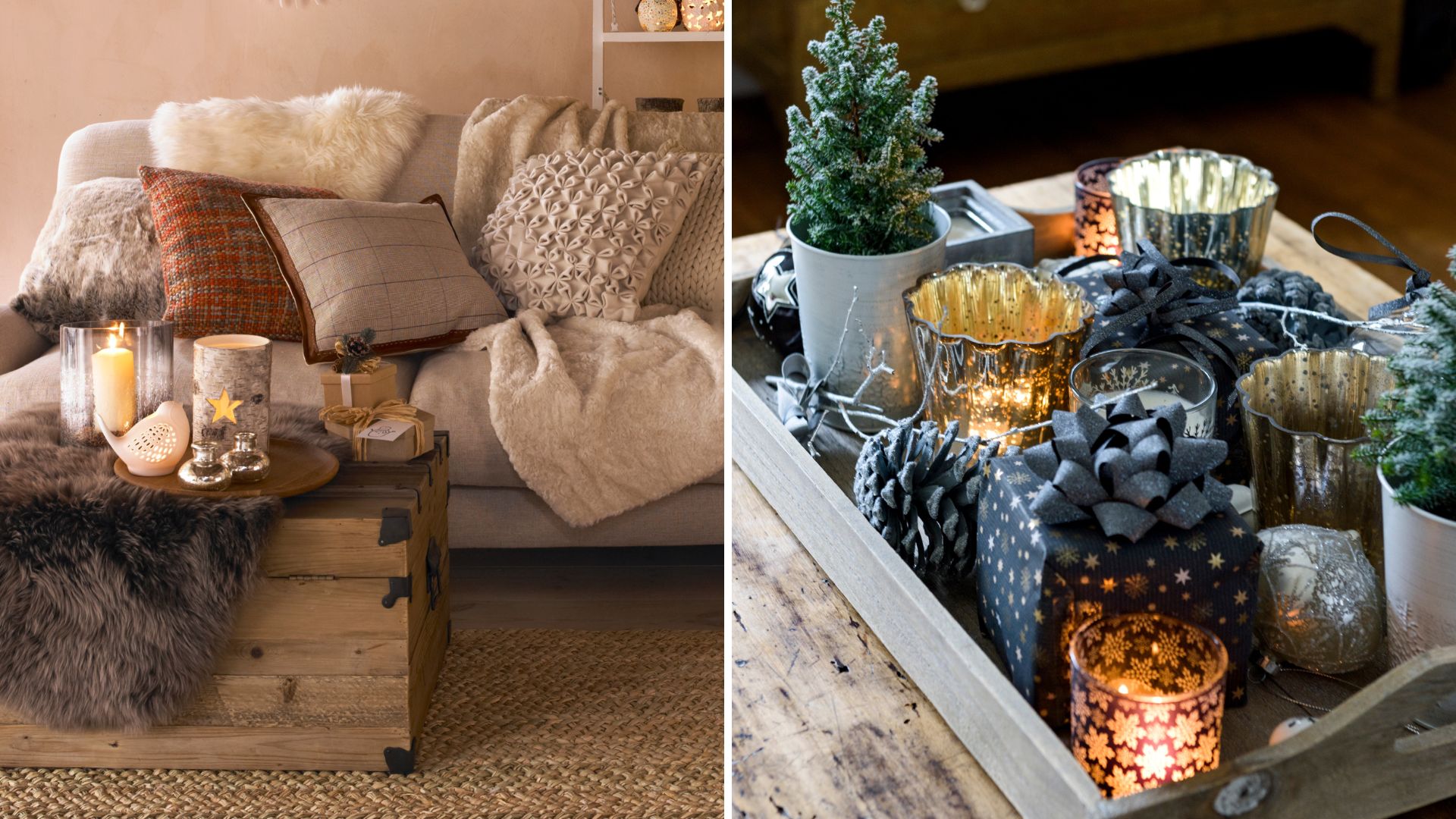
Filling a tray with Christmas decor is one of the easiest Christmas decorating ideas for your home – it'll take you a matter of minutes and doesn't require any awkward hanging of items! So if you're looking for a low-maintenance way to make your home feel festive, this is it.
When it comes to styling it, Jess suggests, "Grouping decor items of similar colours or textures can create a lovely minimalist look. Or if kitsch is more your thing then the more eclectic the collection of decor on the tray then the better!"
Grab a rustic wooden tray (you could even spray-paint it white or silver), and pop on mini Christmas trees, pine cones, candles, or foliage. There's actually a Christmas party game you can play with this tray of fragrant festive items too, that involves people having to guess what's on the tray while blindfolded! An easy entertainment option if you're hosting a Christmas party this year.
23. Place sentimental Christmas signs
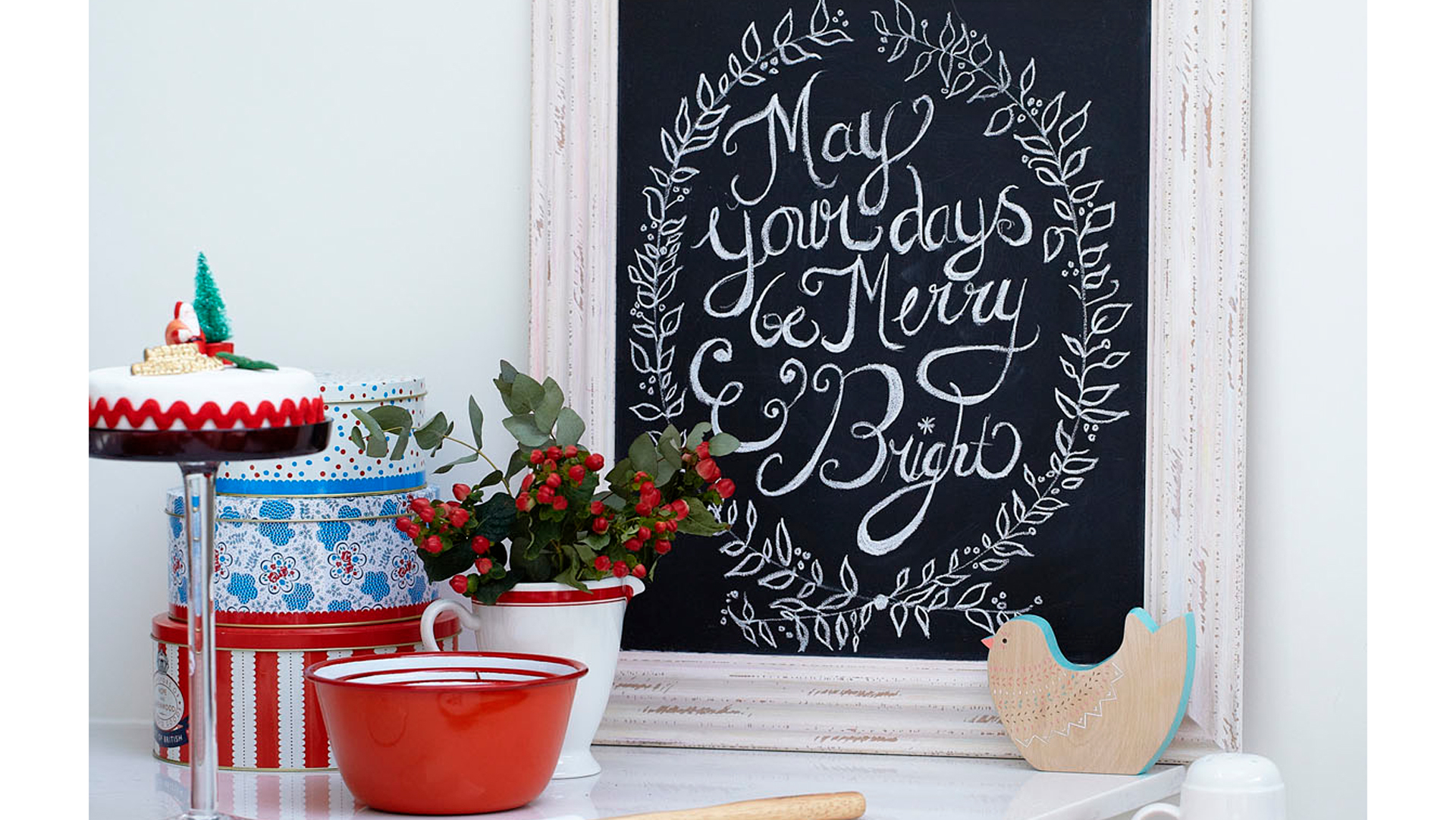
Similarly to switching out your regular wall prints to festive prints, why not display fun Christmas signs on your organised kitchen countertops? These could be official, framed artwork, or you could just grab yourself a chalkboard (as above), and pen a different festive message every day of December.
This is a fun way to get kids involved with some Christmas decorating ideas too—why not have them do some festive doodles after you've written out the message?
24. Place mini trees either side of your front door
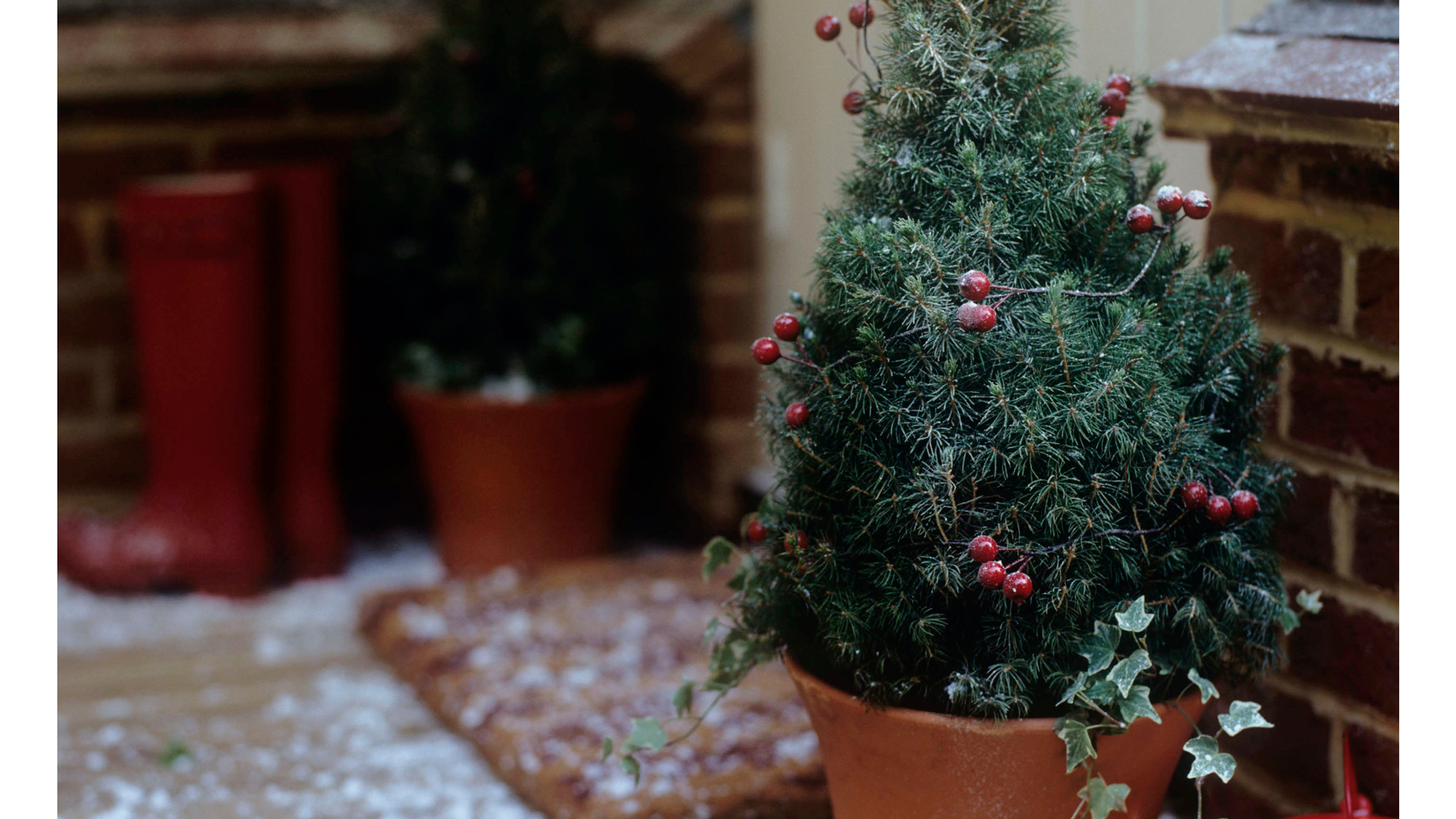
An easy way to decorate your front porch for Christmas is to place small Christmas trees on either side of your door if you have the space.
Perhaps the simplest way to achieve this is to buy potted Christmas trees, which you can get from all good outdoor/garden retailers, and opt for a height of either 2ft or 3ft depending on the area you have to work with. Pop some fairy lights on them and you're good to go.
25. Dress outdoor plants with fairy lights
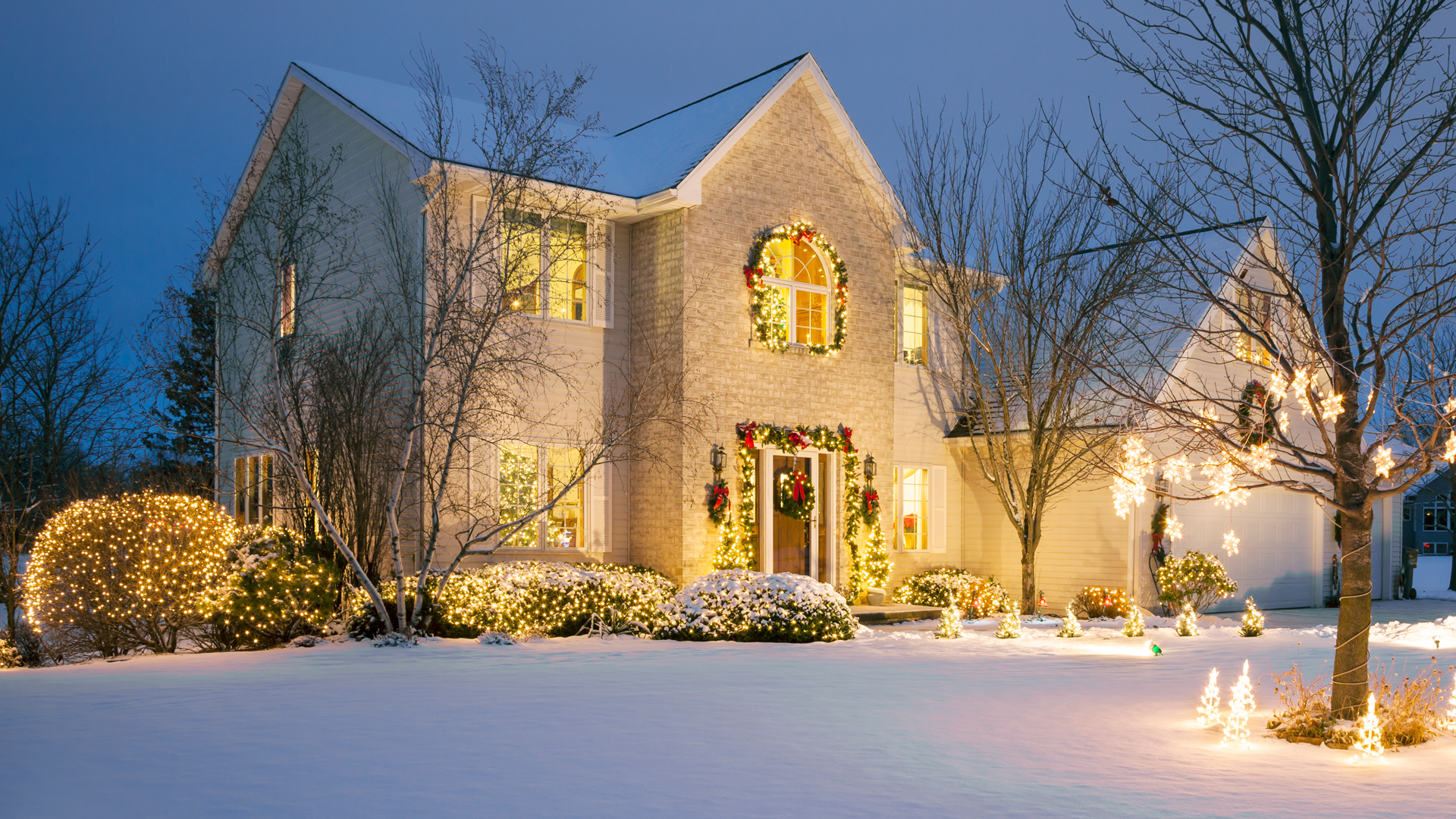
If you're not keen to spend too much time decorating the outside of your home (we spend most of our time inside, anyway), then a very easy decor tip for your front garden or porch is to just drape some fairy lights across your shrubbery or best garden plants.
Zig-zag them across hedges, drape them across potted plants, or wind them around the trunk of any trees in your yard. A quick, easy, and affordable way to add a festive touch to the outside of your house – just be sure to use waterproof, outdoor-specific lights.
26. Fill lanterns with lights
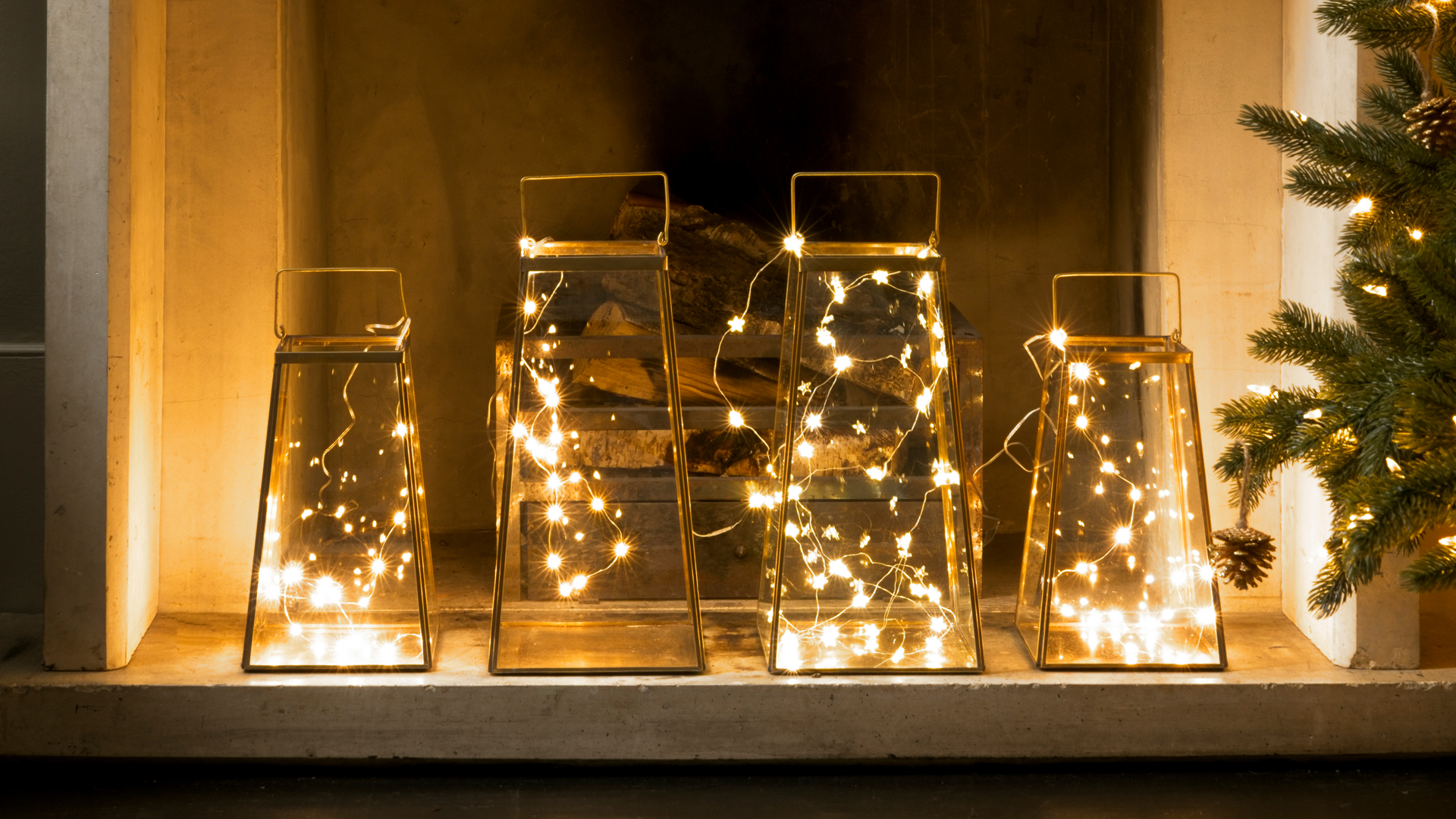
Another fun way to decorate indoors or outdoors is to get an oversized lantern and fill it with baubles and some LED fairy lights for a really special piece of decor. You could also decorate the outside of it with ribbon or tinsel, as well as faux foliage to add extra festive flourish.
27. Style your stairs with a show-stopping garland
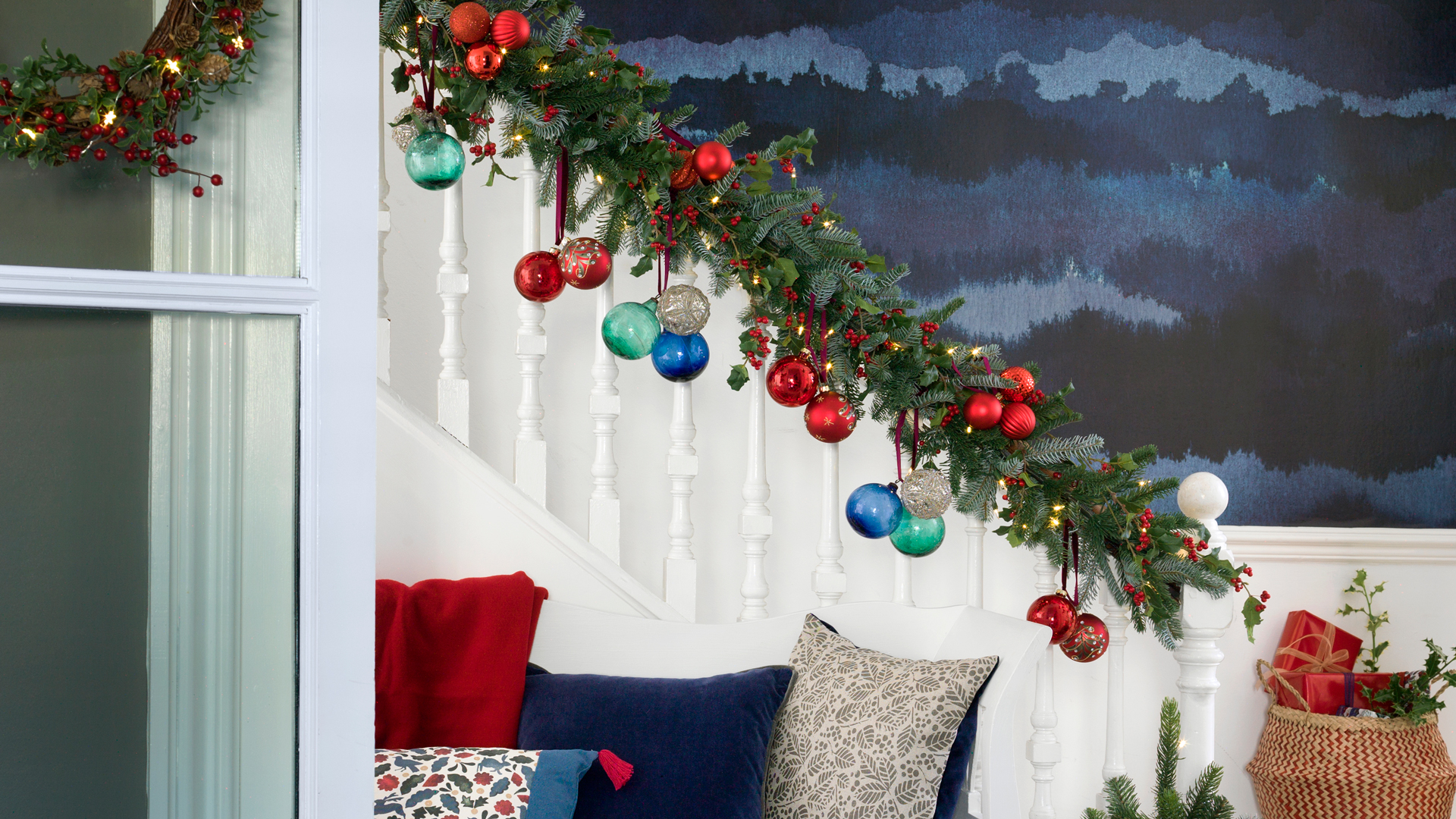
Another room, another garland – they truly are the decor gift that keeps on giving. Jess suggests, "To give your hallway spruce try winding a garland up your staircase bannisters. There’s no need to confine the festive cheer to your main living areas."
Your garland can go either on top of your bannister or on the side – either will be striking. While you could put a regular-sized garland here, an oversized one will add some drama to your entryway. Add pops of colour by hanging Christmas ornaments from the foliage.
28. Light the stairs with ambient lighting
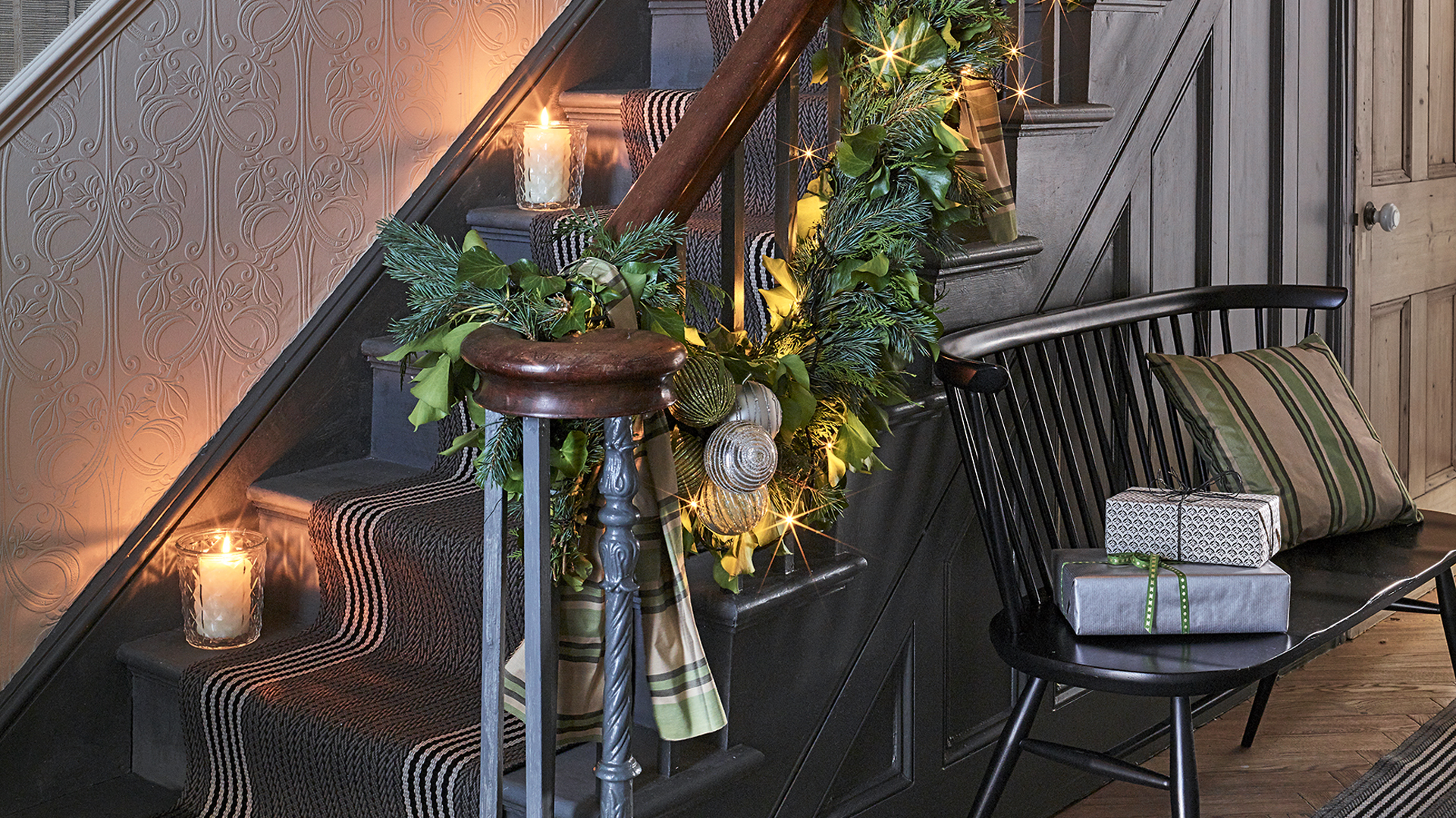
Depending on how practical this is for your home and lifestyle (it may not be a good idea for homes with kids and pets), try placing the best flameless candles (for safety) on either side of your stairs, to create a grand walkway dappled in candlelight.
Not only does it look fabulous, but it also creates a real ambience in your hallway - allowing just enough light to navigate the stairs but not too much that it ruins the intimate atmosphere.
29. Add colour and pattern with 'prop' presents
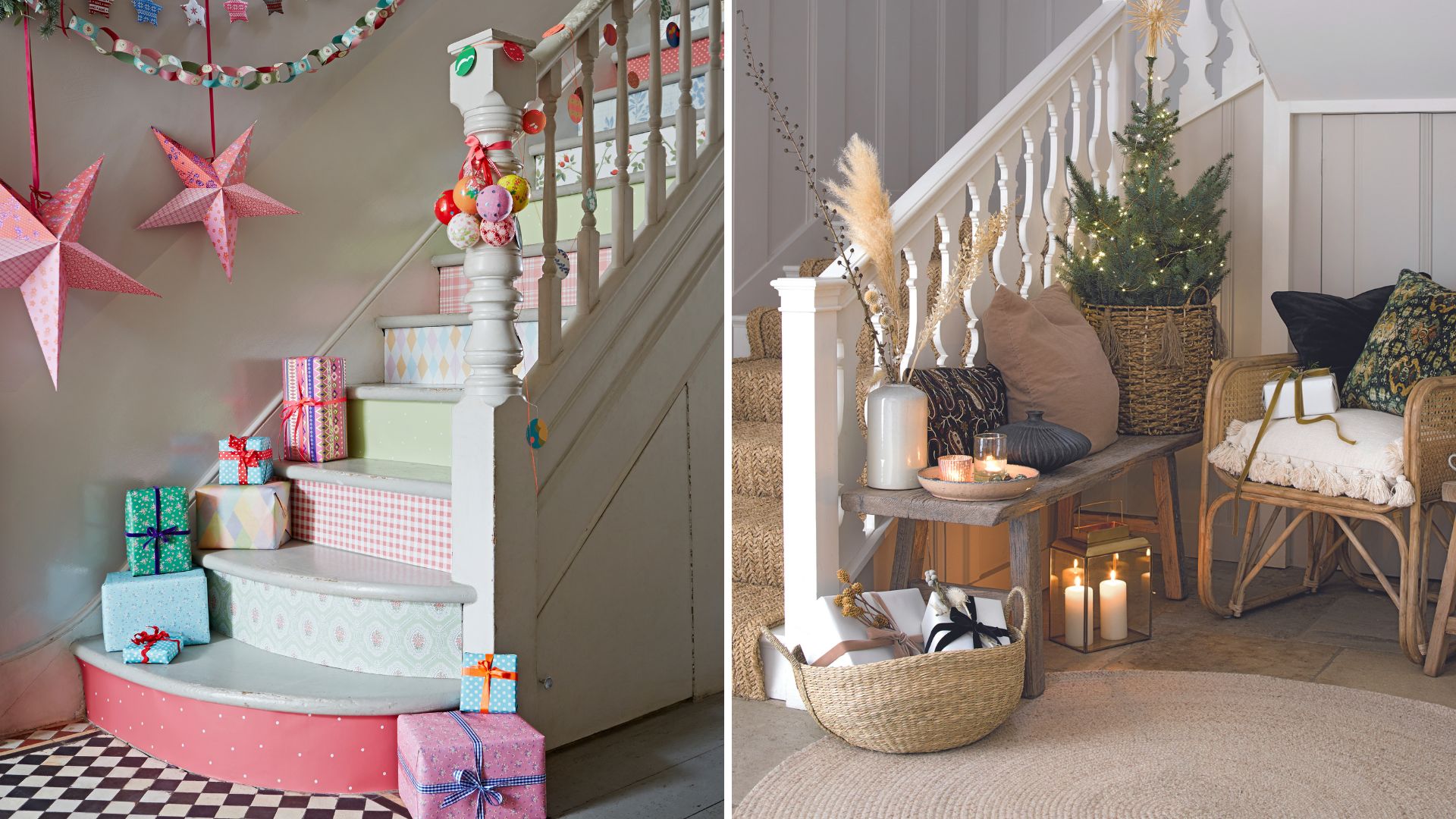
If you'd rather not put candles on either side of your stairs, you could decorate with other festive items such as decoratively wrapped presents – these can be upcycled boxes of any kind, used merely as props to add pattern and colour to your decorating scheme. Of course, these can go anywhere, from under the tree ) until the real presents arrive) to coffee or console tables.
There's no hard and fast rule about what works best – just experiment and see what works for your style and space. Be warned though, you'll want to leave plenty of room to actually walk up and down your staircase, so don't go too large with the boxes you wrap.
30. Decorate with oversized paper decorations
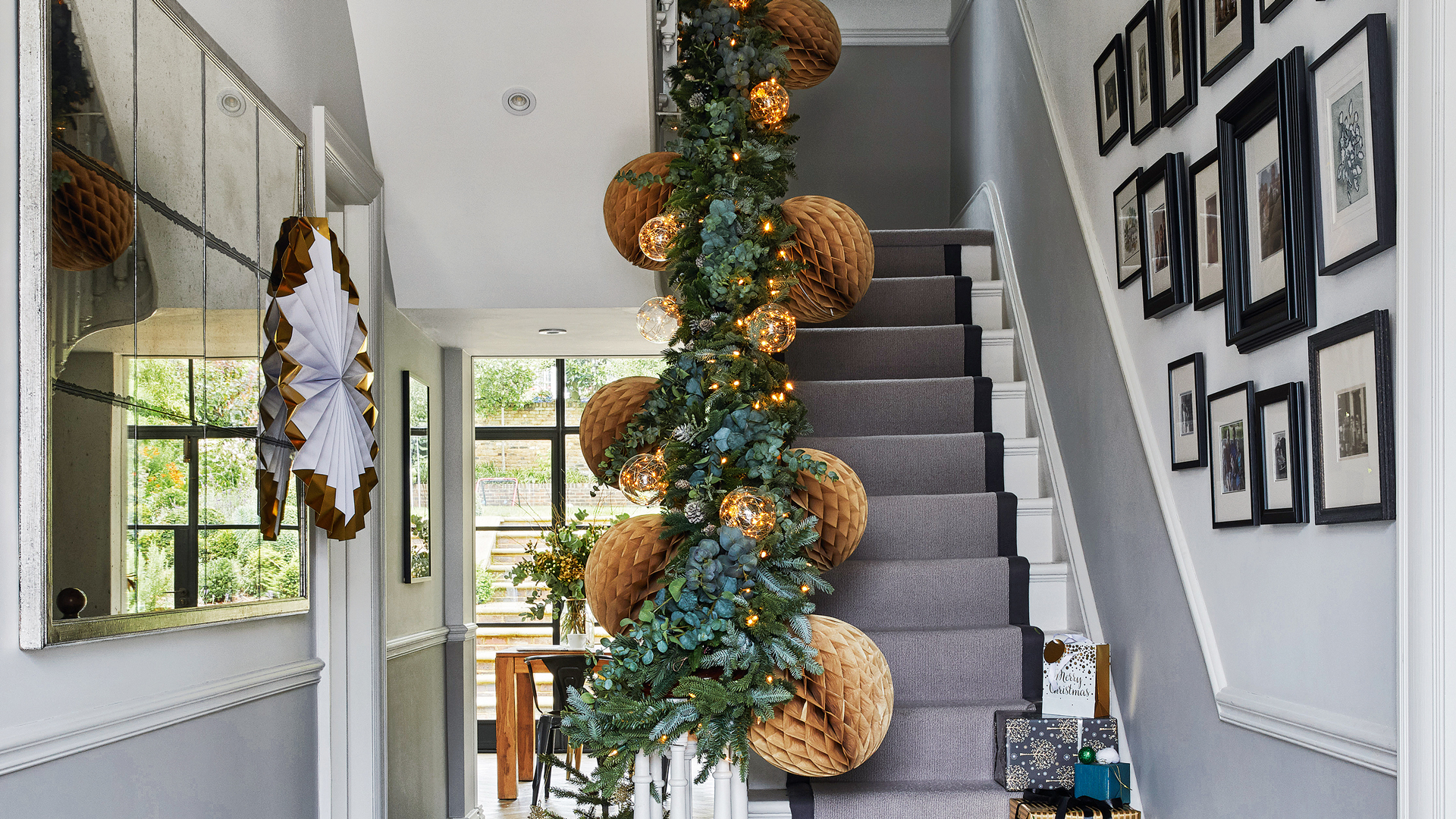
Don't be afraid to go a little OTT with your Christmas decor ideas – in fact, it can look amazing.
So why not embrace the maximalist trend in your Christmas decorating ideas by adorning your bannister with huge, oversized paper pom-poms? The DIY papier-mache ones are brilliant – you can order them in a multitude of different colours and sizes, but best of all they are super easy to make and SO effective.
31. Wrap doors in bows
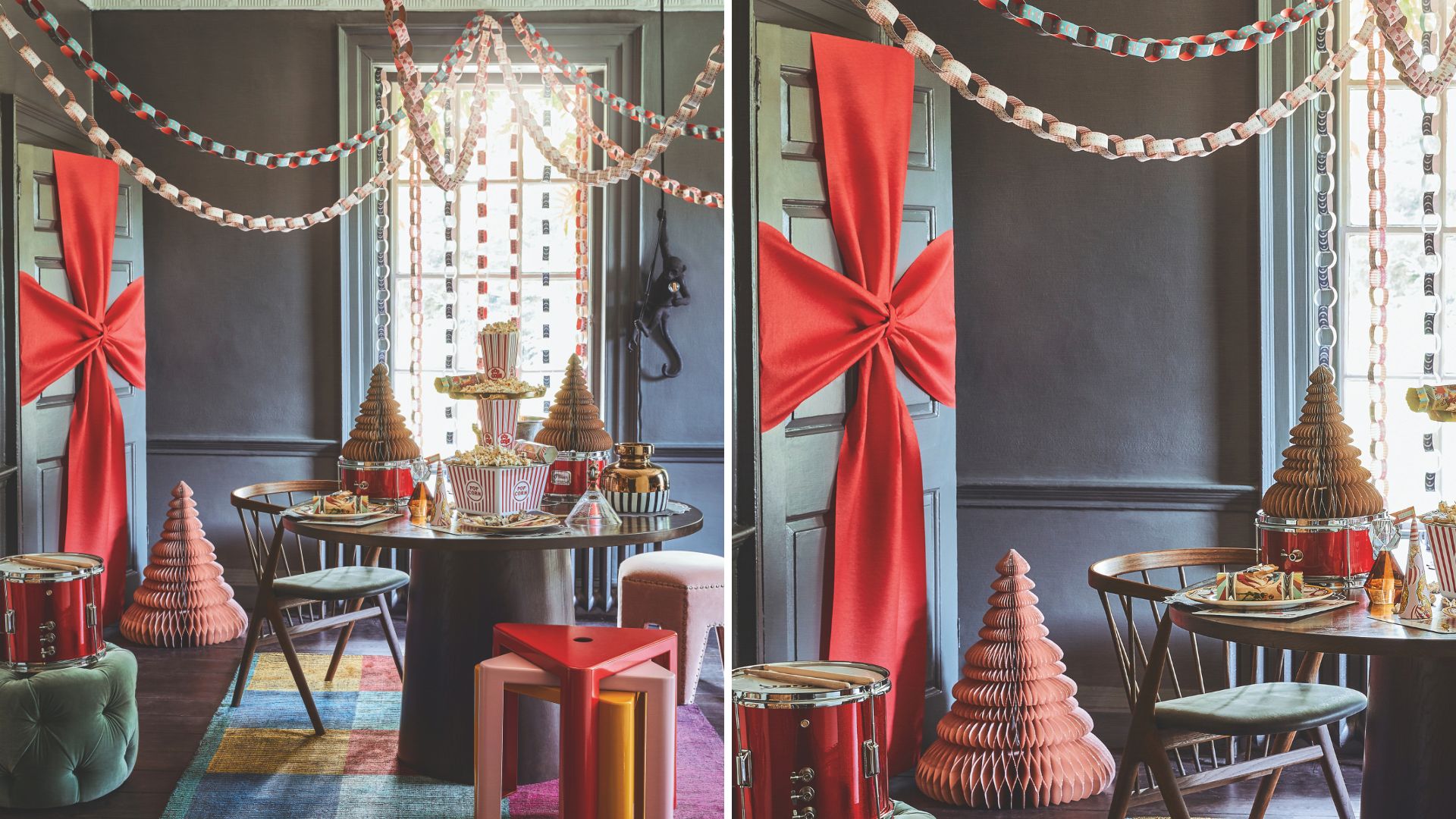
Decorative bows are bigger than ever for Christmas 2024, a good reason to know how to tie a perfect bow. And while they will be adorning trees and garlands galore we suggest making a real style statement by wrapping doors.
This Christmas decorating idea has become popular for front doors but we want to see if taken indoors to elevate the decor inside. You'll need a generous length of paper or fabric to run the full length and width of the door. but your efforts will be well worth it (as you can see above)
What to consider when decorating your home for Christmas
Taking a moment to consider your Christmas decorations before putting them together, or altering them, is a good idea to ensure your home doesn't look too haphazard, and that you have some semblance of a running theme throughout your home.
Before you begin decorating or redecorating, consider:
- Decorate beyond just the tree: It’s important to remember that decorations are not reserved only for the Christmas tree, more is most definitely more. Decorate your mantel with foliage, embellish consoles with festive figures, adorn your stairway with garlands decorated with baubles, and swap in a seasonal doormat to extend a festive welcome the minute guests step through the front door.
- Keep precious pieces out of the way of little hands: she also suggests placing decor items you love, or more delicate pieces, away from the reach of little children and pets. Daisy told w&h, "Don’t forget to hang any delicate baubles on your Christmas tree nearer the top and out of the way of furry friends and little hands!"
- Have fun with it: there's no need to make decorating your home for the festive period stressful. Just enjoy it and use items that you love to create a space you can really enjoy being in. Xander Shreenan, an interior designer at home decor brand Dowsing & Reynolds, said "I would say a key rule to decorating is to have fun with it. Use your decorations as a tool to express yourself and to create a feeling of warmth and comfort during the Christmas period."
Amy Hunt is an experienced digital journalist specialising in homes, interiors and hobbies. She began her career working as the features assistant at woman&home magazine, before moving over to the digital side of the brand where she eventually became the Lifestyle Editor up until January 2022. Amy won the Digital Journalist of the Year award at the AOP Awards in 2019 for her work on womanandhome.com.
- Tamara KellyLifestyle Editor
